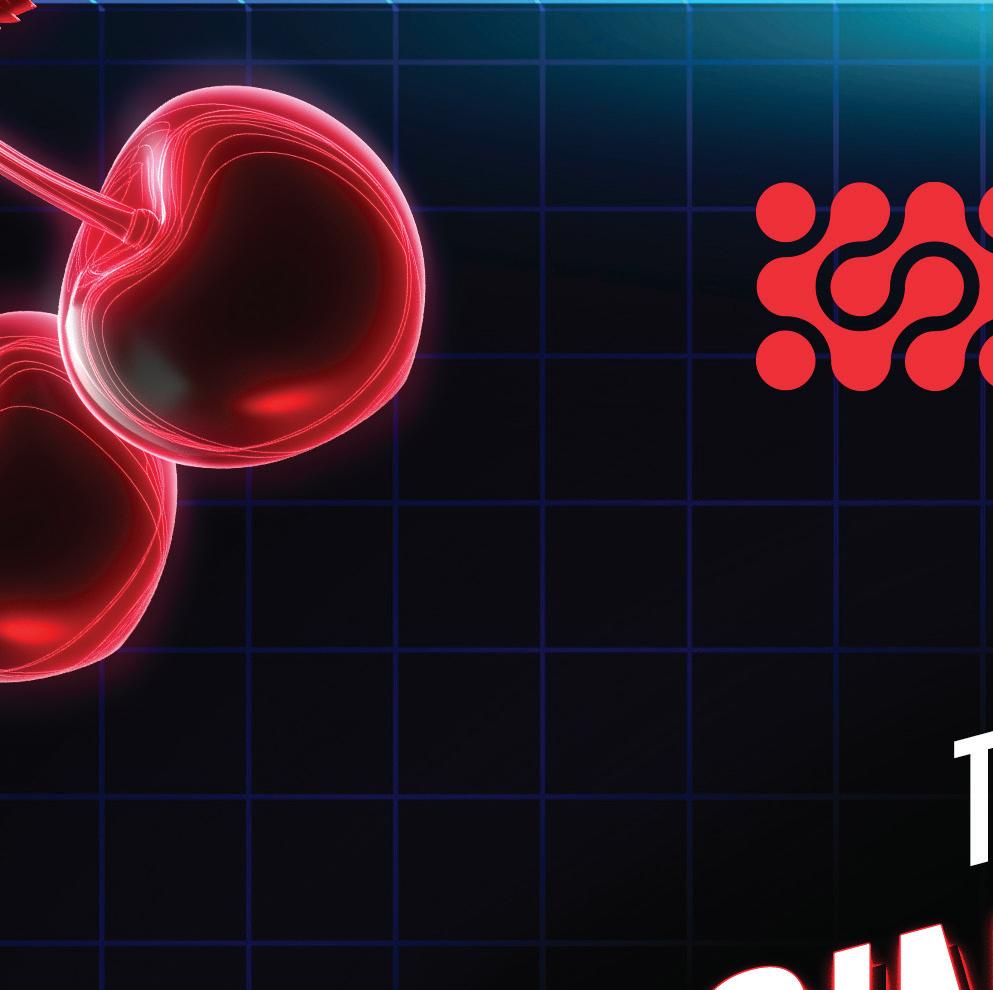
ERNIE STEVENS JR'S LEGACY: We pay tribute to the life of the late IGA Chairman REVEALED: Celebrating the winners at this year's Global Gaming Awards Americas YEAR IN REVIEW: LatAm, Las Vegas, sweepstakes, prediction markets, G2E & more








































































































































ERNIE STEVENS JR'S LEGACY: We pay tribute to the life of the late IGA Chairman REVEALED: Celebrating the winners at this year's Global Gaming Awards Americas YEAR IN REVIEW: LatAm, Las Vegas, sweepstakes, prediction markets, G2E & more













































































































































































COO, EDITOR IN CHIEF
Julian Perry
CONTRIBUTING EDITOR
Tim Poole
SENIOR STAFF WRITER
Beth Turner
STAFF WRITERS
Kirk Geller, Laura Mack, Will Underwood
LEAD DESIGNER
Claudia Astorino
DESIGNERS
Olesya Adamska, Callum Flett, Gabriela Baleva
JUNIOR DESIGNERS
Medina Mammadkhanova, Monika Petrova
ASSISTANT DESIGNER
Tanya Aleksova
ILLUSTRATOR
Judith Chan
MARKETING & EVENTS MANAGER
Mariya Savova
FINANCE & ADMINISTRATION ASSISTANT
Dhruvika Patel
PUBLISHING ASSISTANT
Abi Ockenden
IT MANAGER
Tom Powling
COMMERCIAL DIRECTOR
Deepak Malkani
Deepak@playerspublishing.com
Tel: +44 (0) 204 591 3117
ACCOUNT DIRECTOR
Michael Juqula
Michael.Juqula@gamblinginsider.com
Tel: +44 (0) 207 039 9186
SENIOR ACCOUNT MANAGER
William Aderele
William.Aderele@gamblinginsider.com
Tel: +44 (0) 203 884 9277
BUSINESS DEVELOPMENT MANAGER - U.S.
Miguel Malave
Miguel.Malave@playerspublishing.com
Tel: +1 702 850 8503
ACCOUNT MANAGERS
Irina Litvinova
Irina.Litvinova@gamblinginsider.com
Tel: +44 (0) 203 855 0662
Serena Kwong
Serena.Kwong@gamblinginsider.com
Tel: +44 (0) 203 787 4615
AWARDS SPONSORSHIP MANAGER
Michelle Pugh
Michelle.Pugh@globalgamingawards.com Tel: +44 (0) 207 360 7590
CREDIT MANAGER
Rachel Voit
WITH THANKS TO:

Bruce Wasicsko, Hantao Yuan, David Forman, Zach Bruch, Keith Whyte, Rita W. Garry, Tim Brooks, Alfredo Lazcano, Andrea Avedillo, Aristocrat Gaming, IGT PlayDigital, Incredible Technologies and Inspired Entertainment Gaming America magazine ISSN 2632-766X Produced and published by Players

The passing of Ernie Stevens Jr, Chairman of the Indian Gaming Association, rocked us all recently. There is no other place to begin this Editor's Letter than by Gaming America sending our condolences to Chairman Stevens' family and Tribe. A titan of industry – but mainly community – he will always be remembered.
Unsurprisingly, much transpired elsewhere in gaming this year (as Kirk Geller explores in our cover feature). In fact, it's safe to say the landscape of American gaming changed distinctly in 2025.
In North America, sweepstakes were the talk of the town this time last year but are now facing regulatory peril. In their place have boldly stepped event contracts and prediction markets, the most-discussed vertical in US gaming right now.
In Latin America, 2025 was the year it all came together for Brazil. The nation, along with the rest of LatAm, faces pressing questions regarding taxation, illegal operators and irresponsible influencers. But a newly regulated Brazilian market well and truly kicked off this year, setting the precedent for what could well be, or at least end up, the world's third-largest regulated gaming jurisdiction.
There were, naturally, a multitude of other developments, ranging from tax rates in Illinois to tourism levels in Las Vegas. But, here at Gaming America, we have an update of our own for next year – and we wanted to follow on from the recent edition of Gambling Insider magazine to keep spreading the word.
Indeed, both Gaming America and Gambling Insider magazine are evolving. From January onwards, we will now produce a monthly magazine keeping the whole gaming world up to date in one magazine: Global Gaming Insider. There will be a regional approach to Global Gaming Insider, breaking the publication down into EMEA, APAC and Americas sections. That means none of US, Canada or LatAm will get left behind.
But, alongside our new website, personalized and modernized to meet the needs of today's readers, the evolution of our brand into one global publication reflects the ever-increasing globalization and unification of our industry. So, from now on, whether you want to read about online casinos in Europe or land-based casinos in Las Vegas, Global Gaming Insider has you covered, all in one magazine.
Importantly, however, we won't be losing our coverage of all things American gaming, as prediction markets heat up, Las Vegas decides on its new direction and Tribal gaming continues to grow. One of the most rewarding aspects of publishing Gaming America magazine has been our focus on all things Tribal. There is nothing else like it in the world. That's exactly why Global Gaming Insider will continue covering it, with a dedicated Tribal Focus issue also on the calendar.
Elsewhere in our November/December edition, we have interviews covering everything from fantasy sports to casinos in Henderson, Nevada, contributions from the American Gaming Association, Keith Whyte and more, and a review of Mexican gaming's 2025.
We also go through the winners of October's Global Gaming Awards Americas in Las Vegas. Not only do we have a whole section covering the worthy winners, in fact, we review the three products that triumphed in specific product-related categories at the end of the magazine.
So there is plenty to catch up on in our last issue of 2025. But there is growth on a global scale to look ahead to in 2026. Join us for the journey.
JULIAN PERRY, COO, Editor-in-Chief
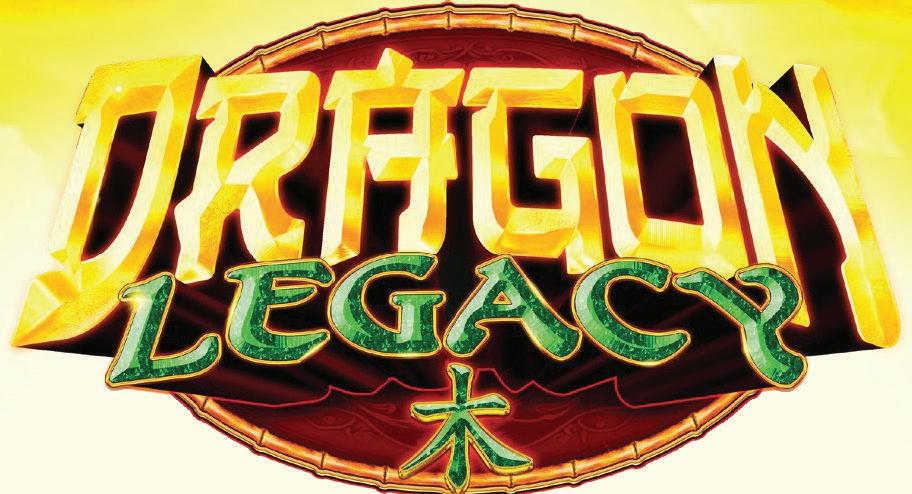

Experience a thrilling fusion of innovation and tradition—where every spin can ignite Premium wins, Red Envelope reveals, and epic jackpot excitement.


The legacy begins are you ready to claim your fortune?


















Gaming America contributor Keith Whyte explores the importance of a stable foundation for RG tool engagement.
Gaming America reflects on the legacy of the late Ernie Stevens Jr, former IGA Chairman.
Gaming America’s Kirk Geller and the AGA’s VP of Research David Forman look back over the biggest show in American gaming.
MyPrize Founder & CEO, Zach Bruch, sits down with Gaming America to discuss the past, present and future of the intriguing social casino landscape.
Bruce Wasicsko and Hantao Yuan, Co-Founders of Moku, explore the DFS industry ahead of the platform’s Grand Arena product launch.
18
Returning Gaming America contributor, Rita W. Garry of Howard & Howard Attorneys explains how to minimize the risk of cyberattacks in modern gaming.
Emerald Island Casino & Rainbow Club GM Tim Brooks speaks with Gaming America about why ‘taking people's money fast doesn't make you rich fast.’
Gaming America reflects on this year’s deserved winners at the industry’s most prestigious Awards ceremony.



42 REVIEWING A YEAR OF CHANGE
Kirk Geller takes a deep dive into the evolution of the Pan-American gaming landscape over the course of 2025, exploring prediction markets, sweepstakes, Brazil and more...
54 UNDER THE SPOTLIGHT
In the wake of Brazil’s revolutionary regulation in 2025, Gaming America casts its eye over the wider LatAm region ahead of the new year.
56
Mexican gaming lawyers from the Lazcano Sámano law firm, Alfredo Lazcano and Andrea Avedillo, look back over the nation’s 2025 in gaming.
60
64
PRODUCT REVIEWS
Gaming America surveys the latest gaming innovations from the worthy winners of the Global Gaming Awards Americas 2025 ceremony.
PRODUCT REVIEWS – BONUS!
Gaming America looks at more products from across US casino floors in a bumper edition of our product reviews section to close out the year.
The Chairman of the Indian Gaming Association was much missed at this year's G2E conference, having passed away in September.
“A walking monument of our history,” “A warrior, a leader and a friend,” “Not only a national leader, but a smoke dancer and cultural practitioner.”
On the death of Ernest ‘Ernie’ Stevens Jr, Chairman of the Indian Gaming Association (IGA), these were just some of sentiments shared between those within the gambling industry who knew him. But the whole industry felt his passing keenly, and it was right that much of G2E was spent celebrating the legacy he leaves behind. That desire to remember Chairman Stevens at Las Vegas extended far beyond the Tribal communities he represented, with so many having their own stories of meeting the great man. It was a conference he attended many times in his

official capacity, standing up for Tribal interests and spreading his message, and his success in this regard is well known to those who dealt with him. Looking into the numbers, that success stands clear and irrefutable.
Stevens Jr was first elected Chairman of IGA in 2000. He spent the following 25 years tirelessly performing this role, achieving re-election on 12 further occasions. Popular as he was, this recurring mandate was utterly backed up in the rise of US Tribal gaming revenues across this period. In 2000, they stood at an overall $11bn; in 2024 revenues were measured at $43.9bn. His tenure saw unceasing growth and in one of many acts of recognition throughout Chairman Stevens’ life, he was, in 2015, inducted into the American Gaming Association’s Hall of Fame.
As ever, Chairman Stevens was looking to the future, keen never to rest on his laurels, he was as determined to build on last year’s record-breaking numbers. He was honored again as recently as August 2025 in Milwaukee, where he gave this message: “For 24 years, I’ve stayed committed, and I plan to maintain this focus moving forward. Together, we’ll push our proactive agenda and stand united as Indian Country to defend tribal sovereignty at all costs. I promised I would give my all, day in and day out, to support tribal government gaming efforts. It’s an honor to be your messenger, amplifying the voices of our elected tribal officials, and I’ll carry your message with pride and purpose.”
This dauntless fighting spirit was central to Chairman Stevens work because it was central to his life. Boxing out of Carson City as a teenager, he became state heavyweight
champion in 1976 and defended his title three times in 1977, 1978, and 1979. Continuing his education, he went on to pick up his Associate Degree from Haskell Indian Junior college. That commitment to learning never dimmed, and after marrying his wife Cheryl he would later collect a Bachelor’s Degree in Criminal Justice from Mount Senario College in 1996 and a Masters degree in Management from the University of Phoenix in 2021.
In striving for the betterment of Indian Country, he was very much following in his Father’s footsteps. A Korean War veteran, Ernie Stevens Sr worked in the Bureau of Indian Affairs and was chosen to lead a commission in 1975, reviewing the relationship between the Tribal nations and the US Government.
With that in mind, Stevens Jr’s election as a Councilman for the Oneida Nation in 1993 will have been a source of great pride, but when the Washington career took off and Stevens was appointed to the role of First Vice-President of the National Congress of American Indians, a role his father once held, it will have meant a lot to the whole family.
Ernest ‘Ernie’ Stevens Jr passed away on September 26, 2025, survived by his wife Cheryl, five children, his siblings and his mother. His work, supported by those around him, brought about so many benefits to the communities he fought for. G2E rightly paused on Monday to reflect on that work, which will no doubt be carried on by those inspired by the Chairman. In his own words, as was ever the case: “I’m thinking about tomorrow.”
American Gaming Association (AGA) VP of Research David Forman and Gaming America’s Kirk Geller review the 2025 Global Gaming Expo.
What were your G2E highlights?
First of all, thanks to everybody who came out to G2E. It was the 25th anniversary of G2E, so a milestone for the AGA. We were excited to welcome about 25,000 gaming industry professionals to Las Vegas, bringing them together in the undisputed capital of the industry to network with each other, see new products and see new elements of G2E we’ve never had before. This is the first year we had the G2E Dealer Championship, including 34 great competitors from casinos across the country who were showing off some amazing skills in blackjack and roulette. Hopefully we’ll continue that next year, but I think it was a great show this year from our perspective and what we’ve heard from suppliers on the floor and from buyers.
Having released a study into the public perception on sports contract trading shortly before G2E, was there a higher sense of motivation to conduct this research given prediction markets’ growth in 2025?
One of the main reasons we put it out there was to make clear what I think everybody already knows, which is that these sports events contracts are gambling. The company offering them in many cases, depending on when and where, usually doesn’t pretend they’re not gambling. Their ads say bet, bet a lot and bet legally in all 50 states. In other venues, they’ll try to say this is actually a financial instrument like buying soybean futures. We just want to make it clear to folks in the media, regulators and lawmakers that nobody really believes these are like soybean futures. Americans, the people using these products, all overwhelmingly recognize these sports
event contracts are sports betting. They should be regulated like sports betting and, for the most part, people think the companies offering these contracts are exploiting a loophole to do so.
How do these AGA studies give operators and regulators a proper sense of where the gambling industry currently is from a public perception?
They all tie together. We put out about 20 research products a year, and I think they all paint a more positive picture than we read about in the media most of the time. We wrapped up our annual American Attitude Survey, which measures Americans’ participation in gambling and their overall views towards the industry. You wouldn’t believe it, but Americans actually have a better favorability towards the industry than they’ve ever had, which is mainly driven by

DAVID FORMAN VP of Research AGA
more Americans than ever having bet in the past year. Last year, 57% of Americans said they’ve gambled one way or another, whether that’s with a lottery, casino, sportsbook, etc., but now 60% of Americans are betting.
As people have more avenues to legally engage with sports betting, iGaming or casino products, whatever it may be, they’re recognizing this is a great form of entertainment. It’s great value for my entertainment dollar. It’s innovative. That’s driving a more positive view of the industry than people had when it was something that was tucked away in Nevada or New Jersey. People couldn’t really see it or touch it with their own eyes or hands; and they only heard secondhand about its reputation, which a lot of people are out to tarnish.
How can G2E continue to expand and build upon its reputation as the center point of gaming, especially here in North America?
Every year, our events team and our partners are re-evaluating how to bring new things to G2E to make it more valuable for the exhibitors and visitors. I mentioned the Dealer Championship, but they also rolled out new meeting zones, a new media zone and networking lounges. We have influencer lounges now.
There was an iGaming zone that was new this year. It’s hard to imagine what’s going to be the hot topic when G2E rolls around next year, given that just a few months ago, nobody was really talking about sports events contracts and, a year ago, almost nobody was really talking about sweepstakes. It is hard to say what the topic will be at G2E next year, but I have no doubt it’ll be addressed and be top of mind for everybody.

Zach Bruch, Founder & CEO of MyPrize, takes Gaming America through the online social casino’s recent $21m funding round, $250m valuation and the ‘golden age of speculation.’
As Founder & CEO of MyPrize, how do you foresee the social casino space growing over the next few years?
In general, we’re really at the very beginning of these things, and that’s what’s really exciting for us at MyPrize, and more broadly, the entire industry. Ten years ago, there wasn’t a lot of capital in the space or a lot of investors, which means there are less entrepreneurs and less product innovation. Fast forward to today, you see companies like Kalshi and Polymarket, and folks like ourselves, coming into the space in different types of ways.
My personal view is the entire stigma around the gaming industry is going to disappear, and you’re starting to see that slowly with meme coins, everything that happened on Robinhood, GameStop and AMC. Now you’re seeing even more prediction markets where you actually
have real institutions and speculation is at the forefront. We’re at this golden age where the consumer wants fast wins, they want to participate and feel engaged. They don’t want to just consume content, they want to be a part of it. So whether you’re playing on an online slot, a prediction market or making a wager at a sportsbook, it’s taking that next step where you’re actually participating and following along. That’s the big bet we’re making. We’re not just an online gaming business; we really view what we’re doing as an entertainment business. We view all of the speculation as this next place where people are going to have fun on the internet from what had once been a single player experience. At MyPrize, we’re building that camaraderie, we’re making it possible to come online, build community, have fun, have engagement, make friends, possibly have existing celebrities come onto the
platform and we’re excited to make some big announcements in the coming weeks.
When did you first notice this social, or entertainment as you described it, aspect of online gaming becoming an interest from consumers?
Don’t be thrown off by my rock and roll t-shirt, but I’m a history buff of the internet, and if you look back historically, even in the 1990s, you had internet bulletin boards, and that’s where communities formed online. That’s where the community thrived. From there, you had things like AOL chat rooms, Reddit where you can actually have indexed communities and eventually Discord, where you can actually talk and communicate.
All of the internet has grown because of community and when I was looking more broadly at the online gaming space, I looked at two things. I felt as if, one,
the internet gambling space really hadn’t taken off yet, whether it be because of regulatory concerns, the stigma, it hadn’t really happened yet, but also all of online gaming and gambling had been a single player experience.
And that is the antithesis of how the rest of the internet has grown. We recognized we have an opportunity to build the next generation entertainment business and the next generation internet business, where we can really tap into the community within gaming. And we know it can find success because at its core, that’s what makes the win so much fun. When we started asking ourselves those questions, we recognized there’s this wide open opportunity for us to take online gaming and make it what it should be, which is a multiplayer experience, and that’s what we’re doing at MyPrize. It’s why we were able to find such big success in our first year, there was even a wedding where they were streaming and playing slots on the platform.
What does the $21m in funding and $250m valuation say about not only MyPrize, but the future of social casinos?
It’s just the start. I think more and more entrepreneurs are going to enter this space. Some folks might say it could get more competitive and, while I agree, I also think for the consumer, which is ultimately who we care about, they’re going to see a competition to deliver the most fun experiences.
With this funding, of course we’re having the confidence of institutional backers that are coming into our business, but it’s also a sign of where the world is trending and where entertainment is headed. You can’t even turn on the TV without seeing an advertisement for one of our competitive sets because this is what the people want to consume. And for us, it now gives us the opportunity and the war chest to really go and create incredible and beautiful products for our customers; ensuring we’re ultimately delivering them the most fun possible.
How can MyPrize and fellow social casinos grow while respecting the concerns of state regulators and organizations such as the American Gaming Association?
From day one, compliance was the single most important thing to us as a business for a few reasons. Once we felt as if we were building a very strong foundation from a compliance standpoint, we knew it would set us up in the future to ultimately have the largest social gaming business in the country. Secondly, we want to provide that trust and confidence to our player base, so we take it very seriously. It’s a state-bystate issue, but we work with the best legal teams, we work closely with the regulators and we always make sure that what we are doing is in compliance. Obviously, things are going to be constantly shifting, but it’s our job to make sure that we are remaining compliant and, as the future changes, we’re going to find ways where we can participate and do so in a compliant way. That’s how we want to play. We want to be one of the largest players in this space and don’t see a world where we can’t be as large as the FanDuels or DraftKings.
And how does MyPrize set itself apart from other social casinos currently operating in the space?
MyPrize is the most trusted gaming

platform in the US right now, period; for a few reasons. One, we make it very easy for players to deposit into the system, whether through Apple Pay, credit card, ACH and we let you withdraw very quickly. We own and built all of our own technology; it’s not white label, so we have a lot of control from a granular level on our product. We can constantly fine tune how we’re delivering that fun, how we’re listening to the feedback of our player base and how we’re making sure we’re delivering them the best experiences.
A very large differentiator between us and our competitors is we own the underlying technology, we’ve built it and constantly change the product to make sure we’re meeting the needs of our player base today, tomorrow and the next day. Another big differentiator between ourselves and our competitive set in the social gaming space is we’re American. We’re sitting right here in Miami, Florida, our team is US based, but most of our competitors are not. We also have the ability, if you are a content creator, to come onto our platform and start streaming slots or a blackjack hand and actually have the chance to play with your audience.
Would MyPrize still be interested in partnering with land-based operators, despite having control of its own product being viewed as essential?
ZACH BRUCH Founder & CEO MyPrize
Totally, we currently work with all the top game content providers and, as it relates to land-based businesses, if they’re looking to get online we would certainly be open to helping them from the infrastructure standpoint. We want all players to be able to come onto a platform and have fun, and they’d have great distribution because we’ve got a ton of players. We want to be an entertainment business where people can come on and leverage our games business on the back end to monetize and work with their player base. Then on our side, deliver our existing player base an enormous amount of content which they can go discover, have fun and engage with.
Moku Co-Founders Bruce Wasicsko and Hantao
Yuan speak with Gaming America on the company’s upcoming launch of its Grand Arena product and expectations for the DFS industry.
What was the original vision for Grand Arena and where did the idea to integrate sports betting stem from?
Bruce Wasicsko: I come from a sports betting media background, as well as all the work we’ve done at Moku publishing games in web 3. In web 3, it’s sort of modelled after the sports betting user base, chasing big wins, excited about speculation and we saw that many games really weren’t producing that type of content for our users. We really feel as if the daily fantasy aspect of Grand Arena keys in on the folks who are currently in web 3 and what they enjoy, which is more passively speculating and hoping for that big hit. It’s ingrained in their blood, and you get a lot of that same adrenaline from watching your favorite sport or your favorite games, so that’s what we’re trying to build inside the Grand Arena.
With the talk surrounding sports events contracts and prediction markets, does Grand Arena fall under a similar umbrella?
BW: I think it goes even deeper. Within Grand Arena you can own the players as NFTs and they play in this 24/7 game mode, then you’re creating essentially daily fantasy lineups over the gameplay that’s being streamed 24/7. It very much is like skill-based DFS over a game that runs 24/7, where if you want, you can actually own one of the players and gain upside in their wins.
We have the sport, the players and the entire league; and the meta game over it is all self-contained within this ecosystem, which is the really fun part especially if people are enjoying it. You can go on many different levels of engagement all
throughout it. You can own a team, own a player, watch a sport, that’s why I feel like it’s so exciting. It takes that ownership level to a whole different place.
And was that a need Moku saw developing in the DFS space? Players having more control instead of relying on an athlete?
Hantao Yuan: AI is accelerating super fast right now, especially in content, and what we’re seeing is people want to consume content on the AI side but not necessarily produce it themselves. They want to watch AI produce content, like how on TikTok right now everybody’s watching gorillas do cocaine or bears jump on trampolines. The utilization of AI is just enabling us to get to that scale and, in terms of crypto, it gives us the flexibility to make things more trustless.
BW: One of the very interesting things with DFS is its growth in popularity, but








































































































































BRUCE WASICSKO Co-Founder Moku
it’s capped by premier athletes playing games, recovering and then playing games again. You can’t expect an NFL player to play a football game three times a week and you definitely can’t expect them to play it every single day for our entertainment. With AI and these virtual games, they can literally run 24/7, 365, which means reaching a global audience that is primetime in Southeast Asia or LatAm or Europe. This also means our payment can get extremely complex.
Crypto allows us to use these common rails, which anybody worldwide can access and then engage in the game. From an iGaming perspective, crypto can enable us to reach a global audience instantly and saves us so much on operating costs and complexity. There’s a ton of people on web 2 dealing with these complexities every day and don’t even realize this is available.
How does Moku plan on introducing Grand Arena while staying conscious of the grey area surrounding DFS/sports betting legality lawmakers are wary of?
BW: There’s a lot of ethical grey area considerations with those, but we think using AI and using these virtual athletes creates a really nice wedge in iGaming between the always-on casino and the event-based sports betting. There’s this drop-in, drop-out content, which I think is complimentary to those folks interested in skill-based or peer-to-peer play. Right now we’re focused very much on the skill-based fantasy portion of the platform and we’re working with our partners to really understand the landscape of where lawmakers are, with peer-to-peer betting and in-game prediction markets. I think all
of that will come later as we understand more of the field.
Grand Arena is also meant to forge new collaborative betting and give our audience a chance to either join together on one network or play individually, but we definitely want it to feel like a very watchable social experience. We have three pillars, it needs to be trainable, betable and watchable. Anything you watch and anything you play on the platform should be a great viewer experience, and we want to bring people together socially, whether it’s in-game watch parties or peer-to-peer wagering. You can play against each other, with each other, independently in different contests. I wanted it to feel similar to when you’re in the group chat on NFL Sunday. Talk smack, win together and lose together.
Hantao, could you speak on the technology side of Grand Arena, in terms of actually going to place a wager within the platform?
HY: From a user perspective, it’s relatively lower lift, you only need about 20-30 minutes a day, and what you’re actually going to be doing is participating in one or two layers. The first one is open to everybody, which is the daily fantasy, and what you’re doing there is getting a card pack, either buying it directly or on a secondary marketplace, opening it and getting a set of cards which can be entered into daily fantasy contests. We’ll have different types of brackets every day, entry fees for how much each type of game is and you’ll be scored depending on the timeline of those contests. Daily, 24-hour contest or weekly, and your cards will earn points based on the performance of those AI athletes they represent.
If you wanted to go deeper, you could also acquire an athlete and upgrade their stats over time as well. What people are actually watching is 24/7 competition in a very arcade style. In the future, there’s going to be other variations of playing football, soccer, etc. and so the Grand Arena stack is meant to plug into experiences that can be played all the time on top of fantasy.
What are the expectations in terms of releasing Grand Arena to Moku users in 2025?
HY: Timeline wise, we’re going to be launching Grand Arena this year, and what users can expect to start with is a very early version of our infrastructure. They’ll have one experience which they can watch for 24 hours, seven days a week, and they’ll have one set of characters and players that can be speculated on via daily fantasy.
Every season is about three months. After that first season, we’ll integrate new experiences, games, sports and potentially new characters as well. The first iteration will just be a bite-sized, but very focused, version of what it looks like to ensure we can prove this AI entertainment vector works.
How does Grand Arena represent where Moku believes the DFS or eSports industry is heading, potentially with AI, crypto, etc?
HY: I come from an esports background, and I got started with crypto betting on CounterStrike skins. With the evolution of AI, entertainment itself will drastically change because the scale and velocity of how fast content will come will be very different than before. Esports is a net negative spend for every game publisher. They lose a lot of money putting on events, having teams, franchises, leagues and utilizing AI in this


















scale will really give us the ability to do that at lightning fast speeds.
In terms of daily fantasy, I’m Chinese so my parents love gambling, I think it’s in the blood. But I believe everybody has a little bit of gambling in them, they just don’t know it yet because they’ve never been at a slot machine, had the daily fantasy experience or skin in the game for anything. By unlocking that content side and that 24/7 always on, we believe we can unlock that innate gambler in everybody to really be like, ‘oh s**t, I have a way to generate a little bit of income or risk a little bit of money, see outside returns and I have an edge in what I’m doing too.’
























BW: Entertainment itself is trending more towards speculation. You see companies now that are literally built on the premise of you made a $25 purchase, now roll your credit card payment and you’ll either get it for free or pay $50. The future of entertainment is the speculation markets, whether it’s prediction markets, sports betting, and I think this is no different. This is an avenue of entertainment for people which is passive, watchable and entertaining, and being able to do it at the scale of AI where it’s like provably fair, dynamic and reduces the organizational risk of putting on an esports event. I don’t know if you’ve ever tried to run an esports event, getting human players to collaborate and show up on time, but it’s insane. It’s insane for the books to have to deal with on the risk side also. This autonomous entertainment creates a very stable environment for people to speculate reliably 24/7, and I think that’s entertaining.































HANTAO YUAN Co-Founder Moku
The DFS angle makes it much more skillbased to start because, when you create a lineup, you can also add another card that changes how that lineup is scored. Imagine you were playing fantasy football and you had a card that said all wide receiver catches are worth more points, you would build your lineup in a different way than you normally would. We’re doing that for this gaming platform and we think there’ll be a good bit of strategy, hopefully a lot of social flexing and communication during the games –we’re very excited.

The future is here. Readers, meet Global Gaming Insider magazine.
At Gaming America and Gambling Insider , we were proud to produce industry-leading analysis for 15 years, and not least in our flagship magazines.
Now, though, we are bringing the two sister brands together, in one global destination for all your favorite content. Let us walk you through a little bit about how the magazine will work...

Our balanced, analytical journalism will not stop. Nor will our CEO Specials, our cover features and our in-depth interviews.
All of the above will form the main body of our GGI magazines, along with show previews and reviews – and some new additions to spice things up for 2026.
We will also maintain focus on the Global Gaming Awards, the most prestigious Awards in gaming.
But, in the age of personalization, we will be tailoring our publication accordingly. While we’ve been writing about localization within gaming for years, our magazine itself will now apply this very concept.

Indeed, beyond our introductory main section and features, any content produced by contributors will be broken down by region.
We won’t give too many secrets away just yet but, if you’re interested in APAC data, or Americas product reviews, you’ll be able to find exactly what you’re looking for in dedicated sections.
As we’ve already outlined, covering the industry as Gaming America and Gambling Insider was a privilege and an honor. The evolution of our brand, we feel, moves the future forward, tailoring to the demands of how news and content is widely consumed today.
Yet, asked to look back, the memories of our legacy brands will stay forever. While there are too many editions to pick favorites, our 15-year anniversary special for Gambling Insider certainly stands out.
Names such as Peter Jackson, Amy Howe, Gustaf Hagman, Matt Davey, Stepháne Pallez, Per Widerström, Mark Frissora, Jim Murren, Bill Miller and more have graced our CEO Special covers, guranateeing gravitas as they told their stories.
In Gaming America, figures such as Jason Robins, Bill Hornbuckle, John Connelly, Adam Greenblatt, Terry Glebocki, Chairwoman Lynn Valbuena and more have demonstrated the prestige of the Americas.
Zoning in on themes from Tribal gaming to omnichannel, crash games to rebrands, our magazines detail the history of how gaming has grown. That’s not to mention our Focus magazines that have assessed payments, Malta, sports betting, Asia and more.
But we’re not stopping there. Our plans, whether it’s web, video or this very magazine, have you – our readers and viewers – at heart.

Our bespoke content will be separated into EMEA, APAC and Americas, defining the truly global nature of our publication.
Taking our analytical approach forward and maintaining our integrity, Global Gaming Insider aims to deliver everything you need from a gaming industry publication.
We’ll have the whole world in our hands, so to speak, and we can’t wait for you to join us on this journey.
















Returning Gaming America contributor Keith Whyte, the Founder & President of Safer Gambling Strategies, explains how creating a stable foundation with a consumer base is key for operators.
In today’s gambling industry, operators must do more than offer exciting games, big jackpots, or attractive odds ‒ they must earn the deeper trust of their customers. That trust is critical if players are to adopt and regularly use responsible gambling (RG) tools. Without confidence in an operator’s motives and integrity, players may view these tools as checkbox compliance, corporate posturing or even mechanisms to protect the operator rather than the customer. Building trust is therefore not just ethical, it’s essential to both safer gambling and sustainable business.
The first step is ensuring customers even know RG tools exist. According to recent research by the American Gaming Association, 84% of past-year gamblers are aware of at least one responsible gaming tool, and more than 75% of those aware believe the tools are effective. Awareness is high and audiences are receptive, but awareness alone doesn’t translate to adoption.
Operators that merely post RG slogans risk being seen as paying “lip service.” By contrast, operators that embed RG tools into the player experience and provide personalized feedback on spending and risk help normalize safer gambling. When players receive clear, candid data about their behavior, they are more likely to reflect on their play and act on reminders to set limits.
Incentivizing customers to use RG tools can also move the needle. Simply put, money talks: if even a portion of the
average player bonus were instead offered as an incentive to set a limit or take a self-assessment, adoption rates would likely rise dramatically. Trust builds RG tool usage – and RG tool usage builds trust.
While a majority of Americans still support legal gambling, trust doesn’t exist in a vacuum and public attitudes can shift quickly. The UK offers a cautionary tale: perceptions of industry excess sparked public backlash and led to sweeping restrictions. The warning lights are flashing in the US as well.
In 2025, a Pew Research Center survey found that 43% of US adults now believe state-sanctioned sports betting is a “bad thing for society,” up from 34% in 2022.

KEITH WHYTE Founder & President Safer Gambling Strategies
Among young men, opposition to legal sports betting jumped from 22% in 2022 to 47% in 2025. Similarly, an early 2025 Sacred Heart University poll found that about half of Americans believe sports betting has a more negative than positive effect on society, while only one-third view the impact as positive.
In this climate, building trust isn’t optional – it’s urgent.
In a July 2025 Betting Hero survey of iGaming players, trust in operators to help with problem gambling issues is evenly split. But there is a clear connection between RG tool usage and trust. For users who trust an operator, 58% report using their RG tools. Only 14% of those who didn’t trust the operator used their RG tools.
Trust reduces skepticism that RG programs exist only to satisfy regulators or improve optics. It also strengthens customer retention. Players who feel respected and protected are more likely to stay loyal, while those who feel manipulated may churn quickly and complain loudly. This hurts reputation, invites regulatory scrutiny and sparks negative media attention.
Americans may accept gambling as part of everyday life, but they’re growing uneasy about its social costs. The industry’s longterm success will depend on how credibly it demonstrates responsibility and care. Every investment in safer gambling is an investment in trust.
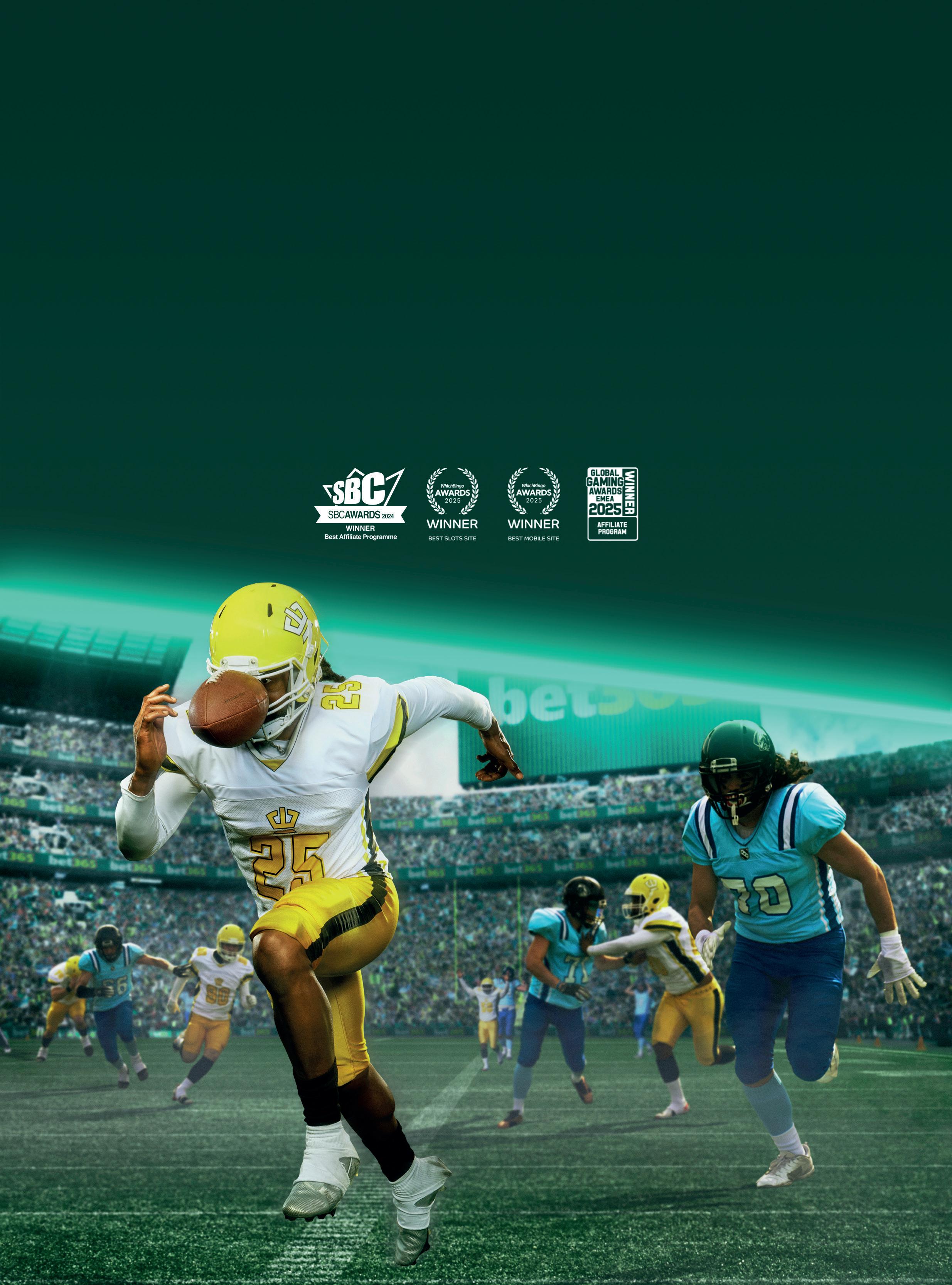










Rita W. Garry, JD, CIPP/US of Howard & Howard Attorneys, returns to the Gaming America pages to discuss minimizing the risk of cyberattacks across the industry.
Gaming is everywhere. Cybercriminals are everywhere all the time. In a $300bn industry working across multiple forums –casinos, mobile apps, iGaming, PCs, esports betting, to name a few – the cyber risks seem endless, inevitable, expensive and unpreventable. Yet everyone tries to limit the risks to protect player data and revenue streams, maintain brand reputation, enhance player engagement, avoid regulatory fines and civil litigation. Generally, they want to be a good partner in a complex ecosystem of owners, operators, developers, service providers, regulators, players and guests. With vast quantities of personal data and meaningful financial transactions, it is not hard to see why the industry is a popular
target for cyber criminals executing data breaches, ransomware attacks, account takeovers, phishing scams and social engineering, fraud and cheating software. The criminals exploit vulnerabilities in game infrastructure, networks, databases and online communication platforms, and take advantage of all potential weaknesses. So, the work must continue and be ongoing to proactively measure and mitigate cybersecurity risks.
The first, and arguably most important, step is to honestly assess your organization’s physical and digital environments; and how data enters and exits those areas (identify
attack surfaces), categorize the data flow types (confidential, personal, nonpersonal), and identify the parties with access and rights to use the data (employees, players, third-party contractors). This big-picture viewpoint will help make choices about cybersecurity strategies more contextually purposeful. Here are several essential strategies:
1. Adopt strong authentication methods Ensuring players use strong authentication protocols is one of the first steps to prevent account takeovers and data breaches. Multi-factor authentication (MFA) is one of the most effective ways to secure accounts. By requiring an



additional layer of security, such as a text message code or authentication app, developers can make it more difficult for attackers to gain unauthorized access to player accounts. Additionally, game development should include strong password protocols.
2. Implement robust data encryption
Player data, including personally identifiable information (PII) and payment details, should be encrypted both in transit and at rest. SSL/TLS encryption should be used for secure communication between gaming servers and clients, ensuring any sensitive data transferred over the network remains protected.
3. Regularly update and patch systems
Outdated software, including game servers and related applications, can have known vulnerabilities that attackers can exploit. Developers should regularly update their systems and promptly apply security patches to fix any identified weaknesses. This is particularly important for online multiplayer games, where vulnerabilities in servers or game clients can be leveraged for attacks like ransomware or exploits that allow
cheating. Security updates should also be integrated into gaming platforms (e.g., Xbox, PlayStation, Steam) to prevent malicious software or hacking tools from gaining access through thirdparty applications.
4. Utilize anti-cheat technologies
One of the persistent challenges in gaming is combating cheating. Cheaters use tools to exploit game mechanics, undermine gameplay and gain an unfair advantage. This not only affects gameplay quality but can also expose gaming systems to cyber risks, such as malware that infects the game client or server. To address this, developers should invest in anti-cheat technologies to detect and prevent cheating software. These tools can identify suspicious patterns and behaviors associated with cheating, including aimbots, wallhacks and other exploits, and prevent players from gaining an unfair advantage.
5. Certify to a security standard
Undertaking certifications to relevant cybersecurity frameworks – NIST Cybersecurity Framework, ISO/IEC 27001, PCI DSS, SOC 2 – helps organization identify their assets, implement controls to protect those assets, standardize





















































































communications, and gain discipline in regular monitoring and improvement. Regular security audits can identify vulnerabilities in game architecture, require routine assessments, penetration testing, vulnerability scanning and code review.
6. Educate players
While developers play a critical role in protecting game infrastructure, players also have a responsibility to safeguard their accounts and personal information. Game companies can provide players with education on safe gaming practices, such as recognizing phishing attacks, using unique and strong passwords, and reporting suspicious behavior. Educational materials should also explain the importance of never sharing account credentials, using secure payment methods for in-game purchases and remaining vigilant against social engineering tactics used by cybercriminals.
7. Deploy Threat Intelligence Tools (TIPs)
TIPs are software platforms that collect, analyze and provide actionable data about cyber threats and vulnerabilities. TIPs provide various types of intelligence –strategic, tactical, operational – align decision making, understand cyber criminals’ tactics, techniques and procedures, and provide real time threat alerts to mitigate loss and speed up response time.
8. Implement secure payment systems
Given the high volume of in-game purchases and virtual currencies, ensuring secure payment systems is vital to minimizing fraud and financial attacks. Developers should integrate trusted and secure payment gateways, such as PayPal, Stripe, or Apple Pay, and ensure they comply with payment card industry data security standards (PCI DSS).
RITA W. GARRY JD, CIPP/US Howard & Howard Attorneys
Capitalizing on the above strategies will ensure a proactive approach with maximum vigilance. The defense never sleeps when the threat is ever-present.


Gaming America walks you through the big winners at the Global Gaming Awards Americas 2025, as the industry's biggest gathering of C-level execs came together to celebrate the outstanding achievers of the last 12 months.





































































the ARISTOCRAT GAMINGPHOENIX LINK



"We’re over the moon to win the Award for Slot of the Year for Phoenix Link."
- Scott Olive, Principal and Founder of HRG Studios












































"It's always humbling to win these Awards, there are some great competitors out there."
- Craig Toner, CEO of Gaming




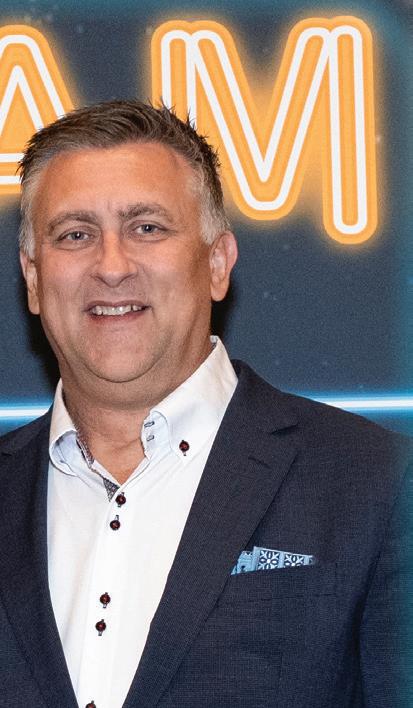

























































"What a great achievement for the company, it’s a great honor and privilege for Aristocrat to win Class III Supplier of the Year."
- Matthew Primmer, Chief Product O icer










GAMING AMERICA | WINNERS REVEALED
INDUSTRY SUPPLIER of the year


DIGITAL




SPORTSBOOK SUPPLIER of the year PROPERTY of the year


DIGITAL INDUSTRY SUPPLIER of the year of the year of the year





























INDUSTRY SUPPLIER


Daniel
LATAM & CARIBBEAN OPERATOR of the year
Lechner, SVP Sales and Marketing
PRODUCT



CUSTOMER LOYALTY PROGRAM of the year
CUSTOMER LOYALTY PROGRAM of the year

CUSTOMER LOYALTY PROGRAM of the year
of the year





PRODUCT












SLOT of the year





CUSTOMER LOYALTY PROGRAM of the year















CAESARS ENTERTAINMENTCAESARS REWARDS


"We wouldn't be anything without our customers and Caesars Rewards underpins everything that we do."
"This Award is an industry great, so we consider this the Grand Slam." SPONSORED
Dominic Hammond, VP of Marketing Strategy, Caesars Digital







SPORTSBOOK SUPPLIER of the year


RESPONSIBLE BUSINESS of the year



























PRODUCT








& CARIBBEAN OPERATOR of the year
































the year



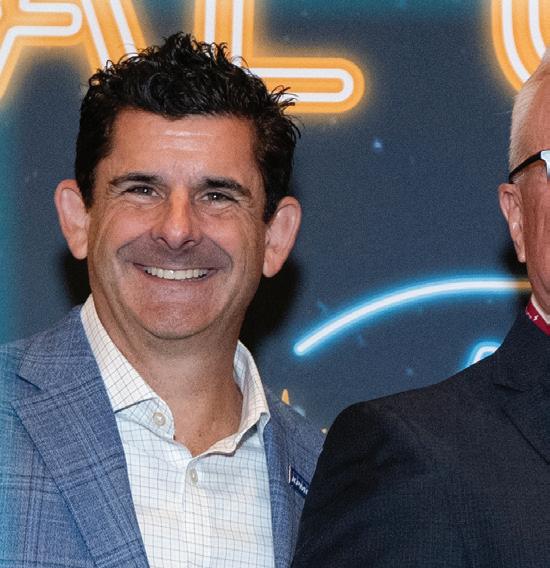
John Zaremba, SVP of Casino Operations
"We look at our casino, we’re eight years young, and we’ve made a lot of great accomplishments, created some tremendous experiences and this Award culminates that." EXECUTIVE of the year




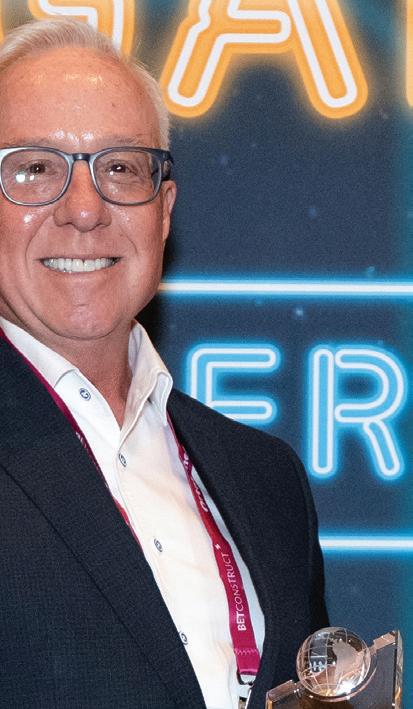
of the year
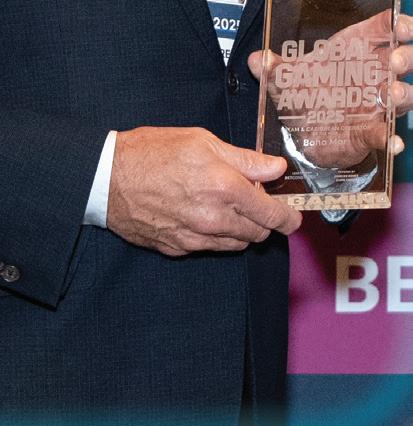



RESPONSIBLE BUSINESS of the year


SERVICES SUPPLIER of the year



















"We look forward to bringing better things in the future after the combination of IGT and Everi."
Darren Simmons, CEO for FinTech









































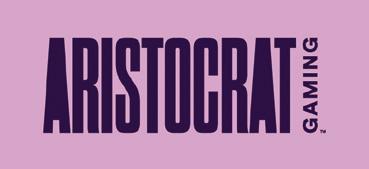





















"It’s a real testament to the great things we are doing at Kambi."
-
Dylan

Mitchard, Senior Sales Director


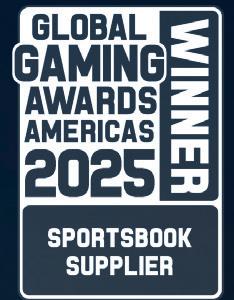

















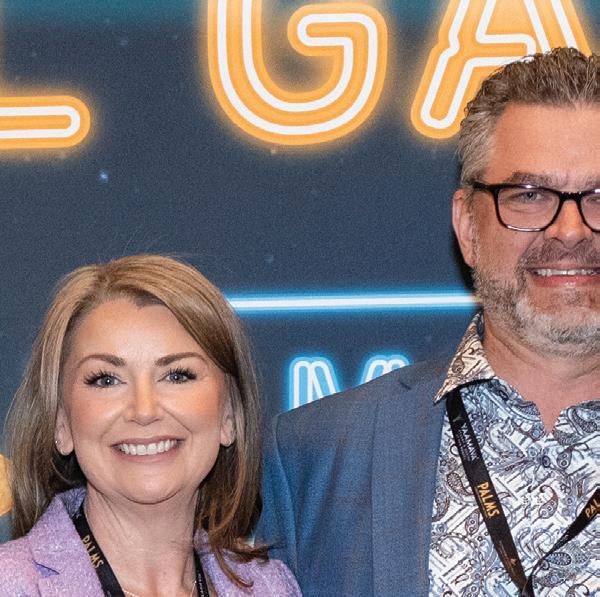
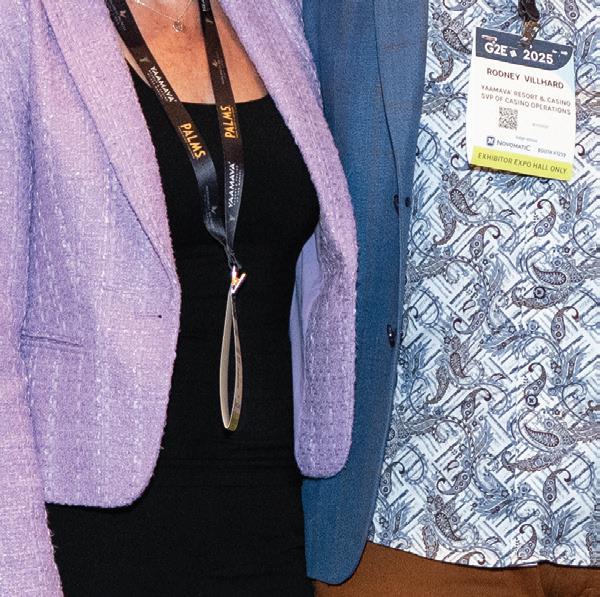





















SPORTSBOOK SUPPLIER of PROPERTY of the year



















"We work really hard as a group and a team to be able to achieve great things and I’m glad people are noticing."
- Kenji Hall, General Manager








Yaamava’ Resort & Casino at San Manuel is the best Southern California casino. With 7,400+ slots, the most high-limit rooms, award-winning spa services, diverse dining selections and top-tier shows, it’s no secret why Yaamava’ is voted the #1 casino outside of Vegas time and time again. Come experience the only AAA Five-Diamond casino hotel and California’s #1 entertainment destination for yourself.











RESPONSIBLE BUSINESS OF THE YEAR 1ST PLACE
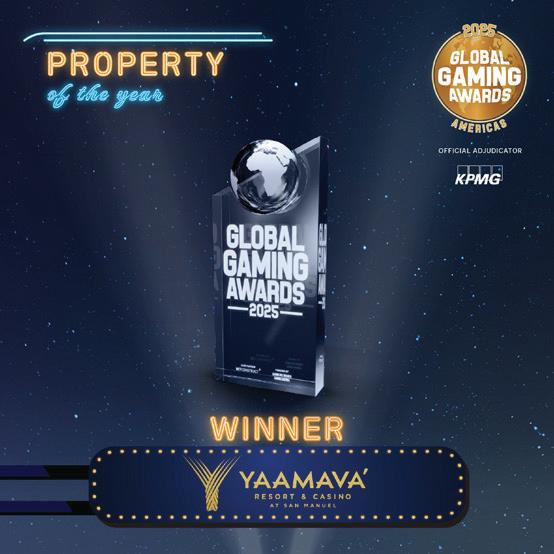
PROPERTY OF THE YEAR 1ST PLACE











































































- Gil Rotem, CEO, IGT PlayDigital






"We’re happy we’re not only leaders in game content but in engagement to make those experiences even better."

















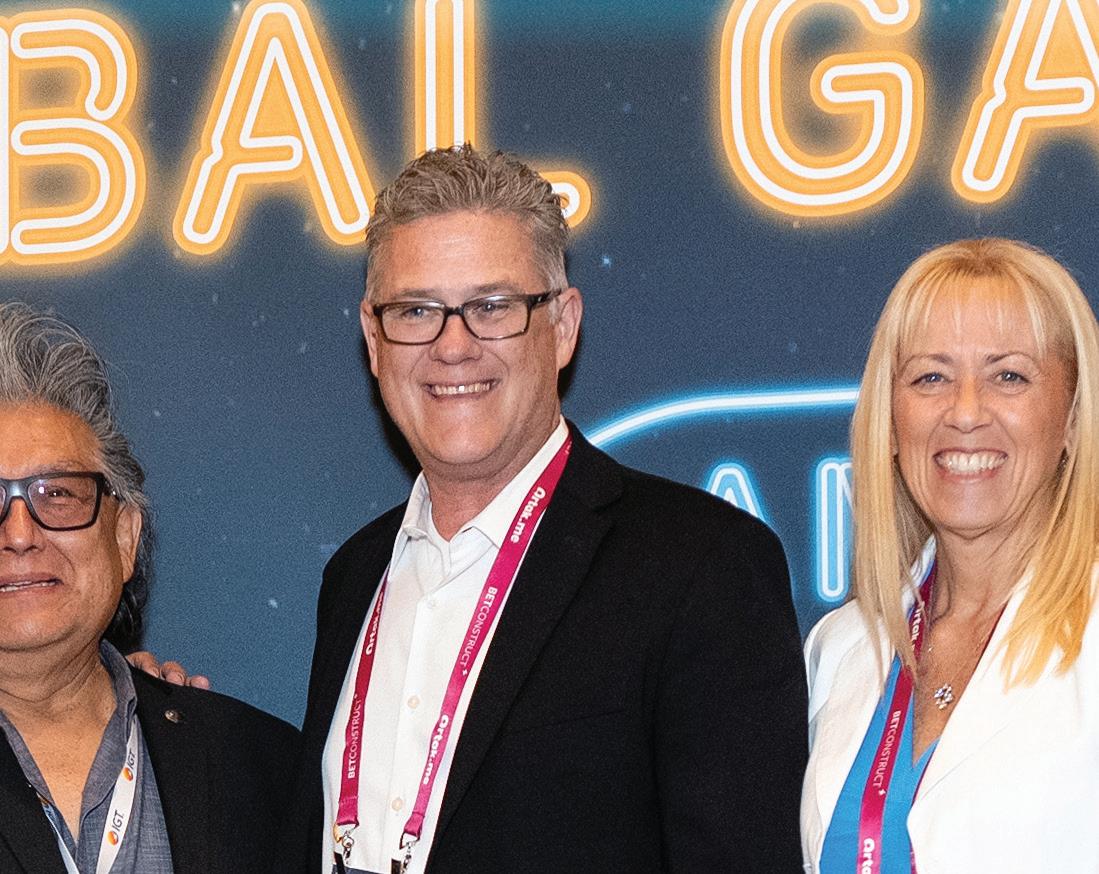

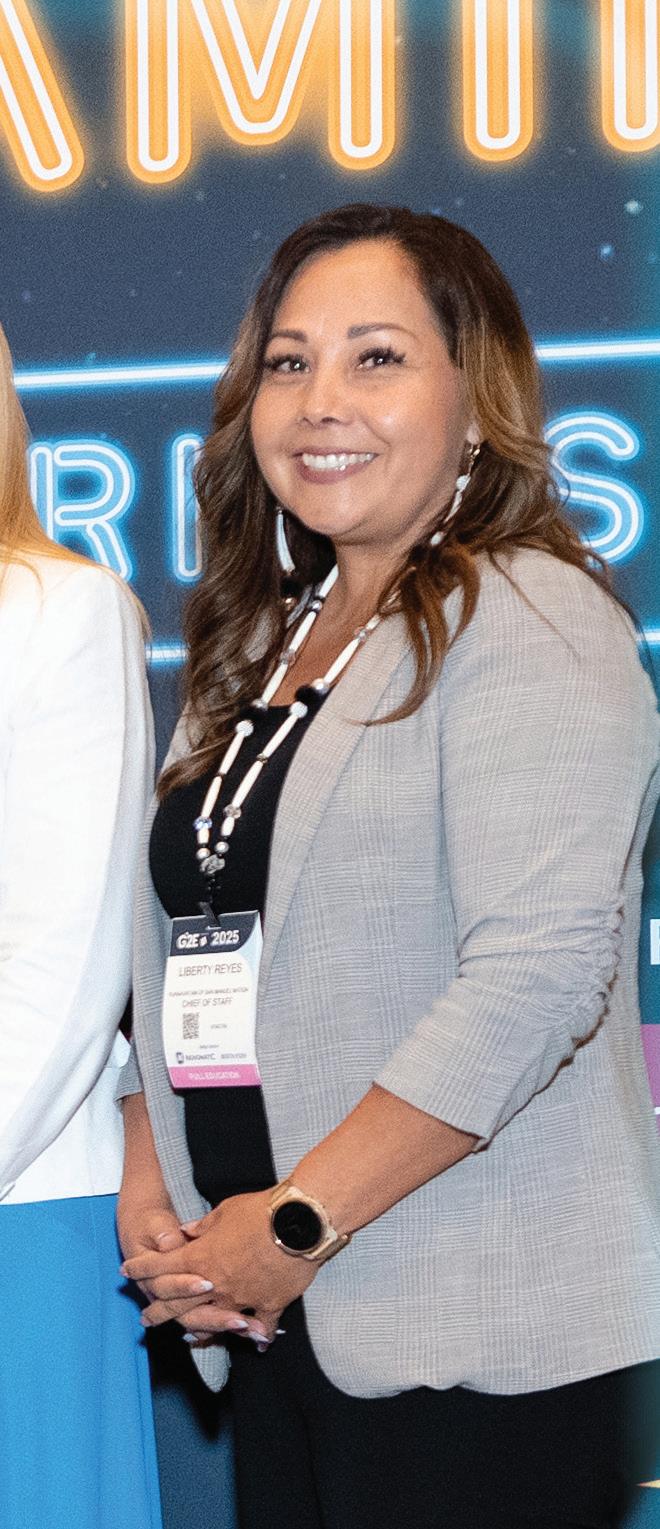




















of the year
































"Yuhaaviatam of San Manuel Nation never sets out to win the Award, it’s just part of who they are."
- Liberty Rayes, Chief of Sta , and Jacob Coin, Strategic Advisor



LAND-BASED OPERATOR of the












Thank you Gaming America Magazine and Global Gaming Awards, for recognizing the Yuhaaviatam of San Manuel Nation as the 2025 Responsible Business of the Year.

We are proud to be honored among our peers for our commitment to set the standard for tribal governments, gaming operations, hospitality businesses and philanthropic organizations connected to global gaming.
















































"We’re a relatively small company and to win a big Award like this is very gratifying."
- Brooks Pierce, President & CEO






LAND-BASED
















SPONSORED BY





























the year












"It's tremendously exciting to win the Digital Operator of the Year Awards."
- Cory Fox, Public Policy & Sustainability




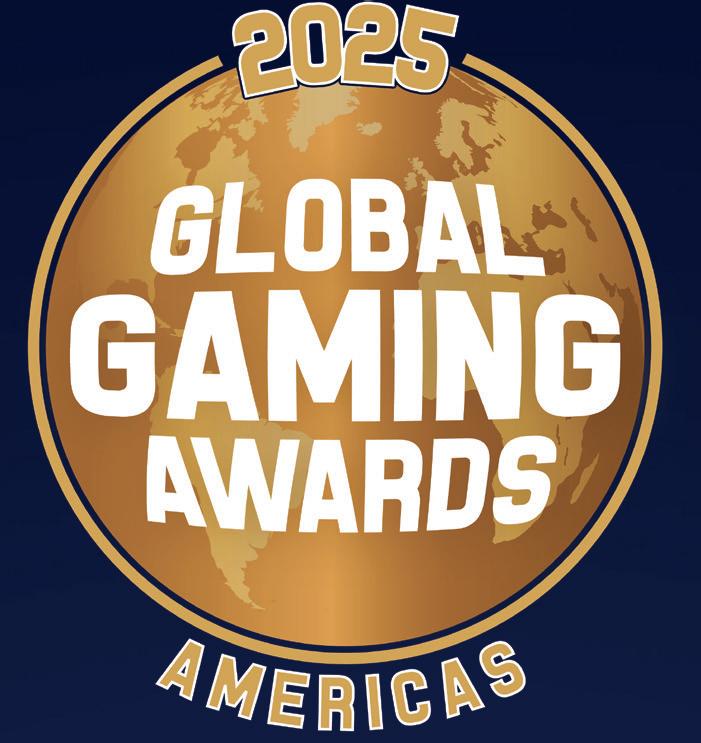








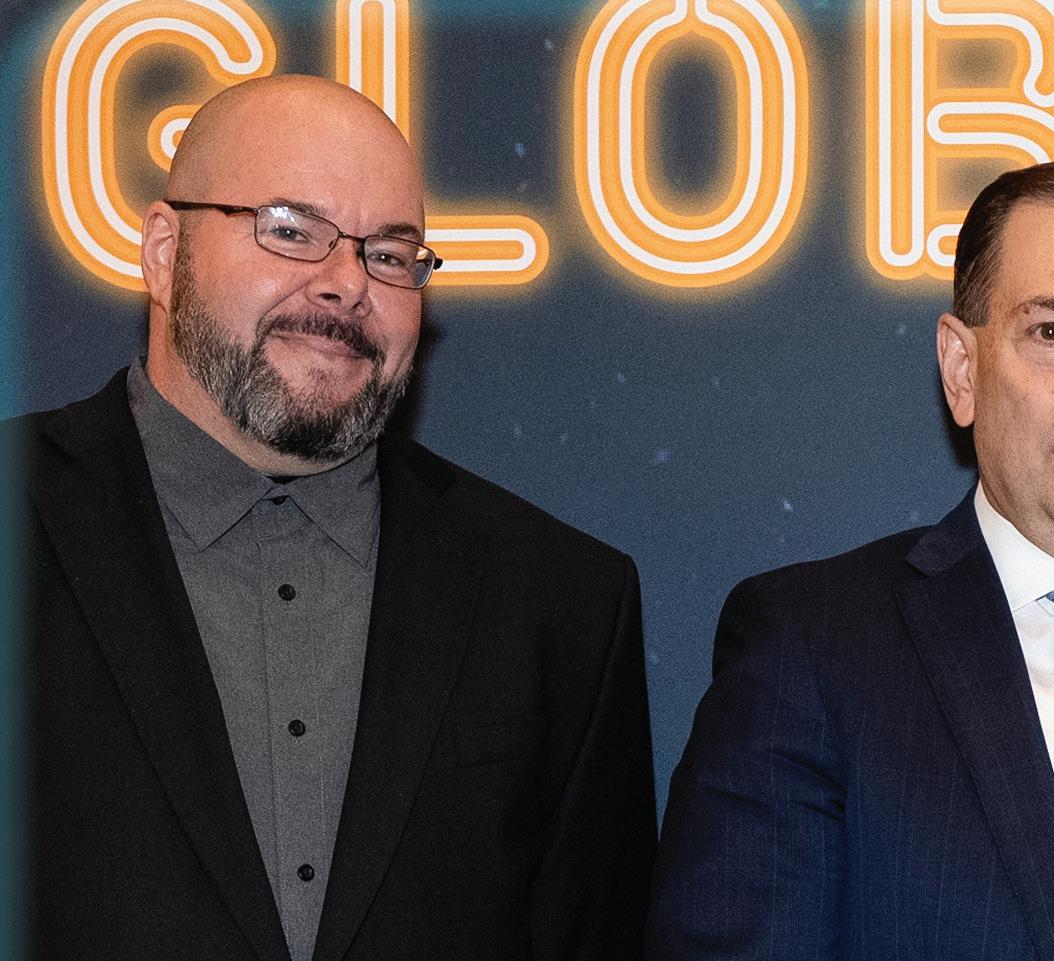






















































- Mike Bishop, Director of Slot Operations, Wynn & Encore Las Vegas





"All of the employees at Wynn show up everyday with one thing in mind, creating a great experience for our guests."



















































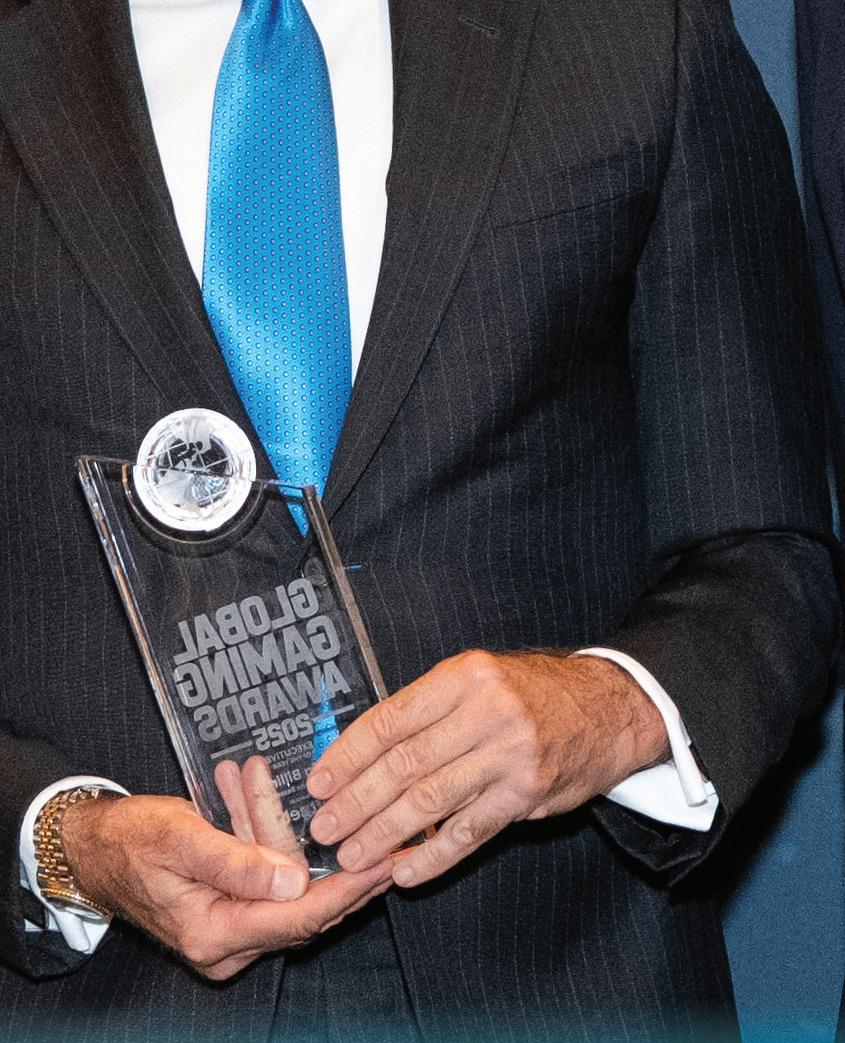














































- Michael Weaver, Chief Communications O icer, on behalf of CEO Craig Billings


















"Craig wanted to make sure everyone realizes that, although he’s incredibly proud to receive this Award, the credit really goes to our thousands of employees across the globe."























































































































































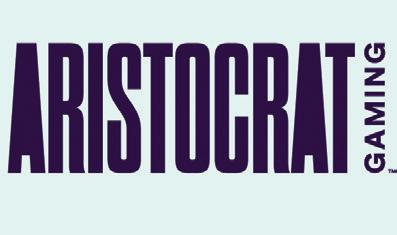
































LEAD PARTNER







CATEGORY SPONSORS










OFFICIAL ADJUDICATOR















Gaming America’s Kirk Geller recaps expansion efforts throughout the Americas in 2025, including Brazil’s iGaming market, sweepstakes, prediction markets, Tribal gaming and G2E in Las Vegas.
Whether in iGaming, sports betting or still relatively unknown gaming types such as sweepstakes, prediction markets and event contracts, the last 12 months have inspired remarkable innovation across American gaming. Even outside of the titles consumers enjoy on a day-to-day basis, significant trends have developed throughout the year, specifically recent tourism numbers recorded in Las Vegas and maturation across Tribal gaming markets. While events such as the Indian Gaming Tradeshow & Convention and Global Gaming Expo (G2E) help to recap the industry’s growth each year, Gaming America looks back upon the biggest trends that developed in 2025.
The very beginning of 2025 saw the launch of Brazil’s fixed-odds sports betting and iGaming regulated market at a federal level, with just under 70 licensed operators beginning to conduct business in the country and 14 of which received definitive licenses. On March 26, the Prizes and Betting Secretariat of the Ministry of Finance (SPA), which acts as the federal regulator of the newly developed market, announced the number of licensed operators had grown to 80, as well as eight companies operating nationwide by determination of court orders.
Developing a sports betting and
iGaming market in Brazil did not come easy for regulators, however, as the SPA was forced to publish a new ordinance on January 15 to solve certification delays for sports betting operators given provisional authorization to conduct business in the country. Beginning operations in Brazil certainly came at a cost for sportsbooks, with sportsbooks paying a $4.8m license fee to gain official approval. Shortly after, the SPA also launched a public consultation for its 2025-2026 Regulatory Agenda, including a 45-day window for multiple groups to make written contributions towards the agenda. The Brazil Government would go on to issue an additional 79 operating licenses by the end of May, covering 177 authorized

brands, while licensing fees alone brought in approximately BR2.2bn ($400m). By the end of June 2025, Brazil’s Ministry of Finance disclosed online betting taxes had brought in nearly BR4bn since the country first began iGaming and sports betting operations on January 1.
According to reports by Receita Federal, the national revenue service, regulators collected BR3.87bn in revenue, with June alone contributing BR780m, representing the highest single-month figure within the first six-month period. The surge surprised even the most hopeful of analysts which projected smaller returns from Brazil’s market, as the BR3.87bn far exceeded initial estimates. Brazil’s Ministry of Sport received BRL478.9m from regulated





















betting operators in the first six months of 2025, based upon official data released from the national Secretary of Prizes and Betting. Within this amount, the National Sports System collected BR154.9m, while the Brazilian Olympic Committee received BR47.5m.
platforms to register as companies in Chile, under the supervision of the country’s Superintendence of Casinos, Betting and Gaming.
responses from organizations such as the Social and Promotional Games Association (SPGA) and the Social Gaming Leadership Alliance (SGLA).


Future challenges still remain for the market, though, as a proposed tax rate increase to 18% in October has “created uncertainty among investors, tightened operating margins and even prompted speculation that some licensed operators might surrender their permits due to financial strain,” according to Gaming America contributor and Director of Institutional Relations at Grupo Esportes Gaming Brasil Hugo Baungartner. Baungartner also stated the Brazilian Government expects sector taxation to generate between BR8bn and BR12bn by the conclusion of 2025, anointing Brazil as one of the “most promising iGaming markets in the world.”

While the growing potential of LatAm’s iGaming and sports betting market is clear, the risk involved of attempting to grow one’s business without proper regulation has become just as direct. With over 80 operators having gained official licensing in Brazil alone throughout 2025, there is also no shortage of competition making itself known across the region, showcasing the monetary opportunities described by analysts such as Baungartner. As the gaming industry closes the book on 2025 and prepares for what should be an even more eventful 2026, all eyes will still remain focused on the development and maturation of LatAm’s prospective future in the months ahead.



But the future of LatAm gaming currently carries as much risk as potential, given some of the issues witnessed with marketing efforts made by operators, specifically the role of influencers in promoting certain brands. In Argentina and Colombia, influencers were under investigation for promoting illegal gambling sites, while Brazilian influencer Maria Karollyny Campos Ferreira was arrested in the state of Tocantins on suspicion of leading a large-scale illegal gambling scheme on September 1. Authorities estimate Ferreira moved approximately $39.5m between 2019 and 2024, as the social media celebrity could face up to 10 years in prison if convicted.

“This bill doesn’t just target sweepstakes, it sends a chilling message to anyone looking to invest in the next generation of gaming innovation,” a spokesperson for the SPGA said. "Nearly every form of online gaming we know today, including companies like FanDuel, a New York-based success story, began as pre-regulated concepts. This legislation criminalizes that innovation cycle.”




In Chile, the country’s Senate approved a bill regulating online betting platforms in August 2025, as Finance Minister Mario Marcel stated the legislation was required due to fast-expanding activity operating outside the law, including illegal entities conducting business without paying taxes or following regulations. Subsecretary Heidi Berner added that the measure targets risks such as money laundering by requiring
While the growth of sweepstakes casinos and the game type’s overall evolution may be best exemplified by efforts made in 2024, the commotion around the legality and opportunity of the offering still continued well into 2025. Sweepstakes casinos have seen considerable increases in revenue and popularity in recent years, including annual revenue growth of 89% between 2019-2022 according to research done by Eilers & Krejcik Gaming. Capping off with a $3.1bn reported revenue during 2022, the sweepstakes market closed with revenue figures of over $8bn in 2024, while Eilers & Krejcik projected totals as high as $11bn by the conclusion of this year.

In June 2025, New York Attorney General Letitia James issued cease-anddesist letters to 26 sweepstakes casinos operators, including Virtual Gaming World (VGW), the parent company of LuckyLand Casino, Chumba Casino and Global Poker, which have exited the state at the time of writing. VGW also began the process of phasing out its sweepstakes promotions in New Jersey on July 29, following Senate approval of bill A5447 just weeks earlier.


New Jersey Governor Phil Murphy officially signed bills A5447 and S4282 into law on August 15, prohibiting sweepstakes casinos from conducting business within the state and establishing new penalties for any unlawful gambling operations.
Shortly after, in September 2025, California Assembly Bill 831, which seeks to ban dualcurrency and prize-awarding sweepstakes operators from the state, officially passed through the state Senate as part of a unanimous 36-0 vote.


Having come into 2025 with the ability to operate in 48 out of 50 states, sweepstakes operators bore witness to regulators taking a more unwavering approach to regulating the offering, as New York, New Jersey and California all introduced new legislation to prohibit the game type to consumers. New York Senate Bill 5935, which includes provisions that would prohibit the activity of sweepstakes casinos, passed through the state Assembly on June 17, prompting

Assemblyman Avellino Valencia recently amended the bill to ensure sweepstakes players will remain unpunished and to prevent the criminalization of state lotteries or non-gambling sweepstakes promotions, leading to no signs of resistance for the legislation ever since. The bill did not prevent VGW from signing a new agreement with the Kletsel Dehe Wintun Nation of the Cortina Rancheria Tribe to operate free-to-play online social games in California on August 18, however, as well as associated sweepstakes promotions. The social gaming operator also stated it had been “increasingly engaging” with California stakeholders at the time





of announcement regarding the future legality of sweepstakes casinos.
On October 11, California Governor Gavin Newsom officially signed AB 831 into law, officially prohibiting the gaming type and its operators from conducting business throughout the state. The future of sweepstakes casinos certainly remains in question, as state regulators continue to take action against any entity looking to introduce sweepstakes gameplay into its respective market. With a projected $11bn industry still in doubt, how operators go about finding success in states where sweepstakes gameplay has not yet been prohibited will continue to generate headlines as the industry prepares for 2026.



No gaming type garnered more attention throughout 2025 than prediction markets and event contract trading, with multiple operators having already taken the steps to begin offering such trading by the start of 2026. On August 20, FanDuel formed a new partnership with derivatives marketplace CME Group to begin the development of “fully funded, event-based contracts with defined risk,” where customers will have the opportunity to “express their views” multiple times a day on numerous markets with “yes” or “no” positions for as low as $1.
audience for trading event-based markets and we want to provide a platform that allows our customers to engage in this activity. We are excited to be partnering with CME Group to design new and engaging products, combining innovation with best-in-class regulatory compliance and consumer protections.”
As part of the agreement, CME Group and FanDuel will form a new joint venture to operate a non-clearing futures commission merchant (FCM) and offer access to event-based contracts through the sports betting operator. Expected to debut in late 2025, event contracts will then be listed on and “subject to the rules” of CME Group exchanges and available to consumers through all participating FCMs.


Just days later in September 2025, Underdog Fantasy struck a new partnership with Crypto.com to add event contract trading to its list of verticals, already including sports betting daily fantasy sports (DFS) games. The collaborations will reportedly focus on offering contracts centered around sporting events, whereas FanDuel and CME Group have specifically highlighted trading of finance and economic contracts rather than those related to sports. DraftKings then entered


“Partnering with CME Group will unlock our ability to bring even more new and engaging products to FanDuel’s fast-growing customer base,” FanDuel Group CEO Amy Howe said at the time of announcement. We believe there is potentially a wide

the mix, acquiring Railbird Exchange.
The quickly formed growth caught the attention of regulators from Pennsylvania, Michigan and Arizona at the time of writing, including official warnings sent out by the respective Executive Directors of each to operators conducting business in the state. Arizona Department of Gaming Director Jackie Johnson was the first to issue a notice of such kind on September 17, having said, “If the Department believes that an entity related to a licensee is partnered with a company that is selling event contracts in a jurisdiction outside Arizona in violation of the laws of that jurisdiction, that might impact a licensing decision.”



Henry Williams, Executive Director of the Michigan Gaming Control Board (MGCB), also issued a warning to operators on October 3 that any business involving prediction markets “would not operate in accordance with state gaming laws,” and even out-of-state trading of sporting event contracts would still garner discipline from the regulator.
“The MGCB understands that certain licensees may be considering opportunities to operate, offer or facilitate access to prediction markets, where individuals can buy, sell and trade event contracts that


“THE EVOLUTION OF SWEEPSTAKES IN 2025 WAS A SIGNAL: THE FUTURE OF GAMING WILL NOT STAND STILL.”














are based on a future event, occurrence or value,” Williams said. “The MGCB writes to make you aware that any involvement in the offering of sporting event contracts, directly or via an affiliate, key person, related business entity or other association, will have implications relative to your licensure in Michigan.”




Finally, Pennsylvania Gaming Control Board Executive Director Kevin O’Toole submitted a letter to the state’s Senators and Congress outlining serious concerns around prediction markets shortly after on October 8. “Sports prediction markets operate under the assertion that they are financial derivatives, or swaps, and therefore claim to not be gambling under state law. These markets effectively create a backdoor to legalized sports betting, operating parallel to, but outside of, the state-regulated system, and without strict oversight,” O’Toole stated.





“The jurisdictional clash carries a significant risk of resulting in inconsistent and inadequate regulation. The CFTC’s framework is designed for derivatives markets often involving sophisticated institutional participants. In contrast, state gaming regulators prioritize consumer protection for the public, implementing detailed measures for responsible gaming, age verification and problem gambling prevention.”




O’Toole also detailed concerns over how long it would take the CFTC to develop a functioning regulatory system and prediction markets oversight, having said, “With all due respect to the CFTC, it would take years for them to create the regulatory system and oversight that state gaming authorities have in place, which would also create a redundancy for a system that already exists and works exceptionally well.




Indian Gaming Association Chairman James Siva on the issue during the Global Gaming Expo (G2E) in Las Vegas, it was made clear prediction markets are the center of attention for nearly every entity in gaming. Chairman Siva related the gaming type’s growth to the daily fantasy sports (DFS) scene in California, where operators such as PrizePicks continue to offer services despite pushback felt from Tribal communities.




Shortly prior to the G2E conference, the American Gaming Association (AGA) released its findings into the public opinion on sports events contracts on September 10, as 85% of Americans believe the gaming type should be classified as gambling, while 80% think sports events contracts should be regulated in similar fashion to online sports betting.

see one and they expect regulators and policymakers to treat them accordingly.” How prediction markets continue to grow could even be the main topic of discussion for next year’s G2E, as the potential success of FanDuel, DraftKings and Underdog may lead to fellow operators partaking in the industry before long. With even fantasy football operators such as Sleeper Fantasy attempting to make headway into the space, the contract trading industry seems set for expansion rather than a regulatory cooldown in 2026.

“With sports betting operational in 38 states and Washington, D.C., consumers expect prediction markets to follow the same rules and safeguards as state-licensed sportsbooks,” AGA President and CEO Bill Miller said. “This research makes clear: Americans know a sports bet when they




“Even worse, the parallel tracks risk confusing patrons who engage in these markets by utilizing the veneer of a highly regulated market when, in reality, their markets are more akin to the ‘wild west.’” Having spoken to figures such as FanDuel SVP of Public Policy & Sustainability Cory Fox, BetMGM CEO Adam Greenblatt and California Nations

















Recounting the efforts made to expand gaming types such as sweepstakes casinos and prediction markets, there has also been plenty of efforts made from Tribal regulators to ensure sovereignty is put at the forefront of any growth witnessed heading into 2026. Beginning with the Indian Gaming Association (IGA) conference held from March 31-April 3 in San Diego, California, the Tribal gaming industry continuously strives to counteract any business made without







































proper regulation from its entities, as witnessed in the history of DFS and traditional sports betting.
During the IGA conference in San Diego, Gaming America spoke with Chairman Siva on the potential threat of sweepstakes and prediction markets and how organizations such as CNIGA attempt to remain out in front of potential growth.




“For me, I try to reach out to people who are subject experts in those areas. With prediction markets, I’ve been trying to learn CFTC speech because they have no idea what Tribal sovereignty is and, frankly, they don’t care. So when we go in there and advocate for ourselves, we have to be able to speak their language.
“We have to talk about why sports betting are event markets and not






prediction markets, speak to the issues with liability, where that ends, where that stops; and use their own terms to get them to understand why these rules are fundamentally incorrect from their own perspective. Again, it’s a lot of education and it’s a lot of work, doing deep dives into online platforms and long phone calls, Zoom calls and all of these things. It can be really complicated and at the end of the day, as a Tribal leader, my main focus is running our Tribal Government back home, taking care of our Tribal citizens, but these are direct threats to them.”




of the Oneida Nation of Wisconsin and described by the National Congress of American Indians (NCAI) as a “towering advocate for Tribal sovereignty and a peerless champion of Tribal gaming.”
Tribal communities also lost a valued member in former IGA Chairman Ernest “Ernie” Stevens Jr. after his passing on September 29 at the age of 66, a citizen

“HIS WORK NOT ONLY HELPED ELEVATE TRIBAL GOVERNMENT GAMING INTO A POWERFUL DRIVER OF ECONOMIC OPPORTUNITY BUT ALSO SHAPED THE BROADER TRAJECTORY OF OUR INDUSTRY WITH HIS UNWAVERING COMMITMENT.”




Stevens spent over two decades as Chairman of IGA, during which time Tribal gaming revenues in the US rose from $11bn annually in 2000 to $43.9bn for 2024, having earned recognition in the AGA’s Gaming Hall of Fame.



“Today, the American gaming industry mourns the loss of one of its most transformative and respected leaders, Chairman Ernie Stevens, Jr. As Chairman of the Indian Gaming Association for more than two decades, Ernie was a tireless and passionate advocate for Indian Country and a unifying force in advancing Tribal sovereignty through gaming,” Miller said.



“His work not only helped elevate Tribal government gaming into a powerful driver of economic opportunity but also shaped the broader trajectory of our industry with his unwavering commitment to collaboration, integrity and inclusion. His legacy will continue to inspire us as we work to honor the values he championed so well.”
— Bill Miller on Ernie Stevens Jr's legacy









Certain Tribes discovered ways of expanding gaming collaborations in 2025, as VGW signed a new agreement with the Kletsel Dehe Wintun Nation of the Cortina Rancheria Tribe to operate free-to-play online social games platforms, as well as associated sweepstakes promotions, in California on August 18. The partnership, which also involves the Kletsel Economic Development Authority (KEDA), the Tribe’s economic development arm, certainly came as a surprise to those who witnessed Tribal communities fight against sweepstakes operators throughout the year.






“We are delighted to enter into this partnership with KEDA and look forward to working together to ensure economic opportunities well into the future. We’ve operated in North America for more than a decade, creating not only great games, user experiences and entertainment but ensuring this is done safely, responsibly and at the highest level of standards – in line with our core value of ‘we do what’s



right,’” VGW Founder and CEO Laurence Escalante said.
“But we acknowledge that as our business and innovative industry has grown, external interest in what we do has increased, including how we support and engage in the communities where we operate. We take corporate social responsibility seriously and are thrilled to have found a Tribal partner like KEDA.”




Whether fellow Tribes in California follow suit will remain to be seen, as most would fall under the umbrella of wanting to ensure proper regulation is met by sweepstakes operators prior to forming any collaboration. Having fought off the efforts of operators such as FanDuel and DraftKings in the past when each attempted to bypass Tribal regulations in California, the gaming industry is sure to expect continued pushback from respective communities as DFS, sweepstakes and prediction market offerings continue to expand across the US.





“We’re pleased to secure one of two direct mobile licenses in Missouri — paving the way for us to bring DraftKings’ industry-leading online sportsbook to fans across the state,” DraftKings North America President Matt Kalish said following the MGC’s decision. “Missouri is home to several professional teams and deeply passionate fanbases, and we look forward to enhancing their sports experience with a dynamic and responsible mobile platform.”

by Eilers & Krejcik Gaming in September 2024, the Missouri sports betting market is projected to generate $3.4bn in handle, $47.5m in taxable revenue, $4.7m in taxes and a 9.8% hold for operators within the first year of accepting wagers.





While the first half of 2025 was relatively dominated by talk of sweepstakes casinos and eventually prediction markets, traditional sports betting, both in-person and online, still took hold of its fair share of headlines throughout the year. Following a narrow ballot approval in December 2024, the Missouri Gaming Commission (MGC) announced it would be opening its new sports betting market in one year’s time, as the regulator’s website currently states residents can begin wagering on December 1, 2025. Having opened the window to submit applications for a direct sports betting license in May 2025, the MGC eventually awarded both DraftKings and Circa Sports direct licenses on August 15, granting each operator the ability to offer sports wagering services within the state without a casino or professional sports team partner. DraftKings, Circa Sports and FanDuel each filed applications for a direct sports betting license in Missouri, having provided reasoning and official statements as part of a Commission meeting held on August 13.








Circa Sports CEO Derek Stevens commented: “Winning one of Missouri’s first two untethered mobile betting licenses is a great honor. We came in as the long shot against national giants like DraftKings and FanDuel, but our licensure approval today proves there’s room for a different kind of operator. We didn’t win by trying to be the biggest. We won by staying true to who we are, and I want to thank the Missouri Gaming Commission for recognizing that and giving us the opportunity to bring the Circa Sports experience to the State of Missouri.”


The research firm also indicates the state’s education fund could receive up to $105m in tax contributions over the first five years of operation. The study helps to showcase the motivation and eagerness of operators that have already been granted licensing to conduct sports betting operations in Missouri, especially as the state currently holds five professional franchises across the NFL, MLB, NHL and MLS.



The decision to overlook the number one sports betting operator in terms of US market share raised eyebrows across the space, but FanDuel was quick to adjust by forming a new market access agreement with the St. Louis City SC professional soccer team just hours after the MGC awarded DraftKings and Circa Sports on August 15.
BetMGM will also be joining the three operators in bringing its mobile sports betting services to the state after agreeing to a long-term partnership with Century Casinos on May 27, which has already been granted state licensing. Following a “no man left behind” mantra of sorts, Fanatics Betting and Gaming will gain access to the Missouri sports betting market on December 1 following its multi-year agreement with Boyd Gaming, established on August 25.



The two operators will also open Fanatics-branded retail sportsbook facilities at Boyd Gaming’s Ameristar Casino Hotel Kansas City and Ameristar Casino Resort and Spa St. Charles properties in Missouri, pending receipt of all regulatory approvals. According to a 23-page study released

While opportunity certainly awaits in Missouri, controversy was still found within the sports betting industry’s 2025 timeline when Illinois lawmakers chose to pass House Bill 1928 in June, which introduced a $0.25 per wager tax for the first 20 million bets accepted by a sportsbook, increasing to $0.50 per wager thereafter. Almost immediately, Flutter Entertainment, which owns and operates FanDuel, announced its intention to impose a $0.50 transaction fee on all bets placed in Illinois in response to the state’s sports betting tax hike.




“It is important to recognize that there is an optimal level for gaming tax rates that enables operators to provide the best experience for customers, maximize market growth and maximize revenue for states over time. We are disappointed that the Illinois Transaction Fee will disproportionately impact lower wagering recreational customers while also punishing those operators who have invested the most to grow the online regulated market in the state,” Flutter CEO Peter Jackson said.


“We also believe the introduction of the Illinois Transaction Fee will likely motivate some Illinois-based customers to bet with unregulated operators. These operators do not contribute tax revenue to the state, will not collect the newly announced transaction fee and do not offer the same levels of customer protection that regulated operators provide.”







Following in the footsteps of its fellow Goliath, DraftKings also began imposing a $0.50 transaction fee for all mobile and online sports wagers placed in Illinois on September 1, although the operator also stated it would “immediately” remove the fee should HB 1928 be redacted.
DraftKings Co-Founder and CEO Jason Robins spoke on the decision as part of a CEO Special interview with Gaming America, having said, “It doesn’t make sense to place a tax on a wager that’s greater than the expected revenue that’s going to be earned from the wager, and that’s what’s happening at the low-dollar transactions. I see some operators have chosen to implement a minimum bet amount instead of passing the fee along. We’ll see what different solution works, but doing nothing was not an option.

“I look at it less as we hold the cards and more, the way they implemented the law, we couldn’t do nothing. If you do nothing, you end up losing money on a

very high number of bets. We have many wagers that are $0.25, $0.50, $1, $2 and even $5. These are no longer going to be profitable.”
Robins continued: “In some ways, I’m unhappy about it because I feel like it’ll mess up a lot of the market. On the other hand, we are going to see what happens –maybe customers will say the products are better and they’re okay paying a $0.25$0.50 fee. Maybe it’ll be different based on what people are betting, meaning the lower-dollar bets will go offshore and maybe the people betting more won’t care because it’s a rounding error for them.

“It’s really hard to know how it’s going to play out, but I do think we’re going to find out and, in some ways, that’s not the worst thing in the world. Obviously, I wish it didn’t happen this way, but because everybody’s hand was forced, we’re trying to see what happens when a tax increase actually starts to impact the offering to the customer –which has never happened before.”
Fanatics Betting and Gaming chose to institute a $0.25 per bet transaction fee for all wagers placed within Illinois on July 3, having confirmed the decision reflects the “high cost” of operating throughout Illinois, officially beginning to charge users in the fall of 2025.
Some operators chose a different path to continue generating familiar revenue in Illinois, as BetMGM, Hard Rock Bet and Circa Sports all implemented minimum wager requirements for users of the respective sportsbooks. Hard Rock Bet’s $2 minimum wager went into immediate effect for users in Illinois, while BetMGM sent a notice to consumers that its $2.50 minimum wager action would begin on July 16. Circa Sports CEO Derek Stevens released a statement on August 15 explaining the operator’s $10 minimum bet requirement in September.
“After thoughtful consideration, we believe the best course of action for a low-hold, high-volume sportsbook such as Circa Sports is to raise the minimum wager in Illinois. We are reluctant to compromise our best-in-class betting splits or charge our customers a per-bet fee,” Stevens said.







“Beginning Monday, September 1, a $10 minimum wager will take effect, protecting the vast majority of bettors in Illinois. No one should have to pay a fee to make a wager.”
On August 14, ESPN Bet updated its Illinois House Rules to include a $1 minimum bet requirement for all users within the state, confirmed by operator Penn Entertainment. It remains to be seen what type of effect the new changes will have on sports betting in Illinois, as total handle for August 2025 was reported to be north of $600m by the Illinois Gaming Board for professional sports alone.




From the gaming capital of North America, G2E celebrated its 25th anniversary this year, once again bringing together the most prominent names in the gambling industry and covering a myriad of topics to help create a formal understanding of where the industry stands today. G2E also celebrated the life and ever-lasting legacy

of Chairman Stevens, with numerous signs, posters and banners scattered across the convention and expo hall in the The Venetian Resort Las Vegas.
Having been situated in Sin City throughout its duration, it was near impossible to escape G2E without finding time to discuss the recent declines in tourism seen across the Strip in Las Vegas, as discussed by MGM Resorts International President and CEO Bill Hornbuckle during a keynote address.




“Obviously, we’ve been characterized. We all know what’s happened with Canada. We all know what’s happened, particularly this market with Spirit Airlines, in terms of the seats being removed. And so, we are coming out of that,” Hornbuckle said. "But as I look to the future, I think the next 16 months are going to be the best the city has never had or ever seen. And so, what’s on the books, not only with MGM Resorts, but the community at large, literally, is facing up to be the best 16 months.”

Lovat, who has been on the ground for many of Las Vegas’ most historic shifts in operations, don’t encounter the same freight as others residing in the city, given the various examples of operators such as MGM, Wynn and Caesars finding ways to alter its business strategy. Even Emerald Island Casino & Rainbow Club GM Tim Brooks, featured later in this issue, believes one can already see Strip properties realigning how its marketing to tourists, and adjusting prices to continue being on par with locals casinos such as Brooks’.
Having spent a quarter-century bringing the city’s most prominent figures into one building, G2E served as a transparent view into how difficult it remains for fellow major

US gambling markets, such as New Jersey or Pennsylvania, to ever surpass Las Vegas as the gaming capital in the US and North America as a whole. What could result from the recent decline in tourism, however, is an opportunity for local brands such as Station Casinos and Boyd Gaming to expand its respective consumer base to those looking for cheaper alternatives than the Strip.
As the industry already sets its sights on the 2026 edition of G2E, storylines such as sweepstakes casinos, prediction markets and contract trading should continue to dominate headlines going into the new year, with Gaming America also embarking on a new era of media coverage once the calendar flips to January.

According to the Las Vegas Convention and Visitors Authority, hotel occupancy dropped to just 66.7% in early July 2025, while international tourist numbers fell by more than 13% in June alone. Local reports have suggested the increasing prices for hospitality, dining and even basic vacation necessities have driven potential visitors away from Las Vegas, while attractions such as professional sports and The Sphere may be showcasing the city from more of a residential landscape.

“THE NEXT 16 MONTHS ARE GOING TO BE THE BEST THE CITY HAS EVER HAD OR EVER SEEN.” — Bill Hornbuckle, MGM Resorts International President & CEO


While coming to see one’s favorite NFL, NHL and soon-to-be MLB team play one of the local Las Vegas franchises should typically serve as a reasonable excuse to spend time on the Las Vegas Strip, many view it as a chance to save money by staying in a locals-focused resort instead of a tourist-themed establishment. If, by chance, a Las Vegas tourist were to only be in town to see an offering at The Sphere, many have begun asking why is it a necessity to pay the resort fees of a Strip casino when brands such as Station Casinos and Boyd Gaming may be offering lower rates.
Figures such as Hornbuckle and Gaming America contributor Oliver









Emerald Island Casino & Rainbow Club GM Tim Brooks speaks with Gaming America’s Kirk Geller, explaining why ‘taking people’s money fast doesn’t make you rich fast.’
Could you take us through the opening of Emerald Island Casino in 2003, and especially the re-opening of the Rainbow Club during the Covid-19 pandemic?
My twin (!) brother Mike and I founded our company in 2001 and bought the building we’re sitting in now, which was a closed casino named the Pot of Gold. We then applied for a gaming license and remodeled the building in the interim of getting our license. It took about 18 months to completely refurbish the building and obtain our non-restricted gaming license here in the state of Nevada. After we got licensed on May 22, 2003, we opened on the next day, right here in downtown Henderson. We actually closed the Rainbow Club on March 17 2020 and kept it closed until September 17, 2020. From the time we closed, we had a maximum of six months in which we could reopen. We took that time to remodel the Rainbow Club from the former owners, the Pepper Mill Corporation based out of Reno, and we added some things. We changed the slot mix, retained all the employees and then opened our doors on September 17, 2020, exactly six months to the day we were mandated by Governor Steve Sisolak at the time to close our doors. It was a challenge from the beginning, but we made it work and it’s been nothing but a great little casino which compliments the Emerald Island terrifically, being right next door to us.
As the GM of Emerald Island Casino, how does marketing to locals differ from the marketing of properties on the Las Vegas Strip? Well, we have to be very different in terms of marketing plans because we want people
in for the long haul. When you’re marketing to locals, you want them to return and, right now, we’re talking two or three times a week. Whereas on the Strip, some party will come, maybe stay for a few days, then fly or drive away and all of a sudden a new set of people come in. Here, we try to build brand loyalty in a different way. It’s organic growth. What we do is try to cater our promotions, food specials and even our slots we run looser than some of the Strip casinos from what I understand. We want people to come back because what we found is that taking people’s money fast doesn’t make you rich fast.
Are there ways in which the Henderson market would differ to that of Summerlin or Boulder City? They’re all local areas of the valley, and






















































































































































































TIM BROOKS General Manager
Emerald Island Casino & Rainbow Club
with there being no gaming in Boulder City, they have to come to Henderson, which is good for us because we’re the first city on the way to the Strip. In Summerlin, we market to them like we would if you’re a Henderson resident or a local of Boulder City and North Las Vegas. Believe it or not, a good part of our business is from Summerlin and Boulder City. Of course, the lion’s share comes from the city of Henderson because it’s so convenient for our guests to come here. But like I said, we attract customers from all over the valley.
Would that equate to Emerald Island Casino not necessarily feeling the motivation to market to potential tourists?
Correct, our marketing efforts are 100% local and our clientele is 99.9% local. However, keep this in mind, a lot of our employees work or play on the Strip, and so word of mouth has been really good for us. Their customers will say, ‘boy, I’d really like to go to Hoover Dam,’ or ‘I’d like to go check something out in the suburbs,’ and they can say ‘well, you should go to my favorite casino, the Emerald Island or the Rainbow Club.' So we get a lot of business for people that are reaching out from the Strip right now. I mean, they’re charging a lot of money for things, right? It’s become publicly known we’re in a little bit of a slump on the Strip.
Now they’re going to figure it out and everything’s going to be fine. They always do and they’ve already started to figure out because they’re coming up with better value deals and things of that nature, but a lot of people now come to town and they want to explore the suburbs. They read about things or they see things on TV,
whether they’re from the East Coast or the Midwest or across the pond, if you will. They’ll come here and they just don’t want to stay on the Strip completely full-time. They want to go to Death Valley or Hoover Dam and they want to check out Red Rock, so they’re reaching out. There’s a lot of people that, for instance, want to come and have a beer at Love Lady Brewery or Mojave Brewing Company right here on Water Street, so just by osmosis we pick up business that way as well.
Having mentioned the slight drop in tourism, could this open more opportunities for locals casinos such as yourself?
Absolutely, because if people feel as if they don’t want to go to the Strip for whatever the reason may be, they’re going to stay here at local casinos. We do a really good job of making people feel like they’re at home when they come here. For all intents and purposes they are, if they're a local patron.
Could new developments such as The Sphere and sports franchises in Las Vegas be affecting how tourists view the city, perhaps more residential vs. destination?
100%. I mean, if you just look at a Raiders game, over 50% of the fans are from the visiting team. The A’s are coming to Las Vegas, the Golden Knights have been great and were obviously born and raised here, which helped us. What’s really helped us is the Knights built a practice arena for the Silver Knights minor league hockey team 300 yards from here. That really opened the doors and got people’s attention saying ‘hey, Henderson is a cool place to go.’
Because, from a certain point of view, Las Vegas may shift towards a city in which people care less about where they stay, and more the activity they are visiting for…
Exactly, and especially if you’re driving your car from, say, Los Angeles. I had a friend that came over the weekend to
see The Who at the Sphere and Wizard of Oz later in the week, but just spent a few days in Vegas. And they stayed here, they spent their money in the area. They came to Henderson, they had dinner in Henderson, more people always bring more money.
On the competition side, would it be a fair assumption to say Emerald Island Casino focuses more on the Station Casinos and Boyd Gaming properties?
Stations and Boyd are competitors, yes, and they do a fantastic job. They really do. We learn a lot from them. MGM is more for the tourists, they’re local, but they obviously don’t cater to the local casinos as much as Station and Boyd are. They’re very local and they help us too because they bring people to the area. We don’t want to be exactly the same, but we want to take some of the things they do and maybe try to do them better in the confines of a smaller footprint. You can provide, or at least have a better chance of providing,
superior guest service because you’re up close and personal with your customers.
For us here at Emerald Island, we carry 440 machines and right across the street the Rainbow Club has 330 machines, so you can get a lot more in touch with your customers that way, catering to them in an up close and personal manner. Like I said, Station and Boyd do a great job, but it’s probably a little harder for them to reach out and touch every customer that comes through their door.
Finally, how does Emerald Island Casino generate awareness outside of casino operations, such as fundraisers or community activities?
That’s a great question. We’ve been doing that for over 20 years here. We get very involved with the community, the Boys and Girls Club and the Henderson Chamber of Commerce for the University of Nevada, Las Vegas. I’m very proud to say that we’ve probably done more charitable work for a casino our size than anyone in the area.
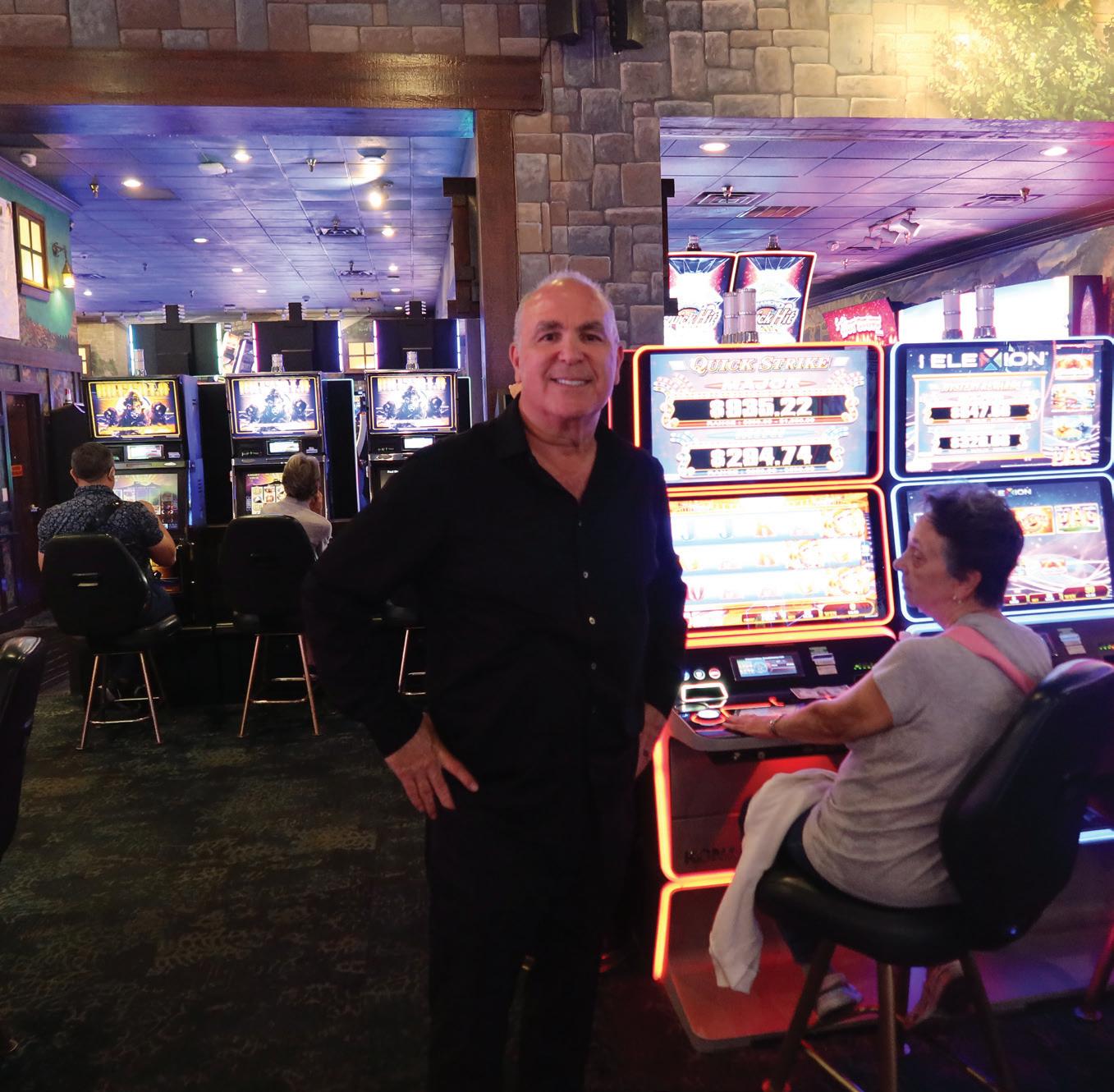
As LatAm’s gaming landscape continues to evolve, the spotlight has turned back to the casino floor. The conversation reveals a mix of nostalgia, labour concerns and scal ambition, proof that the bricksand-mortar side of gaming still holds weight.

Land-based casinos are legal in Mexico under a federal licensing system managed by the Ministry of the Interior. Operators can run casinos offering slot machines, sports betting and some table games. Licenses are typically issued through private concessions and regulatory updates remain sporadic.
Peru has one of the most mature landbased casino markets in the region, legal since 1999. The Ministry of Foreign Trade and Tourism oversees regulation, licensing and taxation of casinos and slot halls. CHILE
Following Enjoy’s decision to relinquish its license for Casino del Mar in Viña del Mar, local authorities have moved to ensure continuity of operations and protect local employment. The company had previously requested an early termination of its license, prompting the Superintendency of Casinos to review procedures for a smooth handover. Viña del Mar’s Mayor reaffirmed the city’s commitment to maintaining the casino’s operations as a vital tourism and economic hub.
Provincial and municipal officials held new talks to prevent job losses linked to the Necochea Casino’s stalled reopening. The Government has indicated interest in repurposing the building for hospitality and entertainment use while maintaining some gaming operations. While the discussions show progress, no definitive plan has yet been confirmed, leaving both workers and residents waiting for clarity on the casino’s future.
Further south, the Chubut Legislature voted to extend existing casino club concessions across the province, ensuring continued operation while authorities prepare a new licensing. Lawmakers described the move as necessary to preserve tax revenue and employment, though it also sparked debate over whether the state should open bidding to new operators.

Colombia has one of the region’s most structured frameworks for land-based casinos, regulated by Coljuegos. Licenses are all taxed and monitored through the centralized system.







Union representatives have called on provincial authorities to act to preserve jobs at the Necochea Casino, warning that closures could deepen unemployment and affect tourism in the region. Redevelopment plans for the site remain unresolved.

In Santa Fe, a new bill aims to prohibit individuals who owe child support payments from entering casinos. Lawmakers argue the measure would promote accountability and align gambling regulations with broader social policy goals.

The Finance Minister has called for fresh progress on long-discussed casino and bingo legislation. The Government views regulated land-based gaming as a potential tool for job creation and tax collection amid ongoing fiscal reform.



Rio’s state lottery has revealed plans for a large-scale entertainment and betting complex dubbed the “Brazilian Las Vegas.” The initiative envisions integrated resort-style venues combining lotteries, gaming, hospitality and cultural attractions.

Casinos in Paraguay are legal under a national concession model supervised by Conajzar, the country’s gaming commission. Its Law No. 7348/2025 has abolished state monopoly, opening the market to private operators.

Land-based casinos are legal and widespread in Uruguay, operating under models regulated by the Casino General Direction. Montevideo and Punta del Este house the country’s most prominent venues, attracting international tourists and generating consistent tax revenue.
















Returning Gaming America contributors from the Lazcano Sámano law firm, Alfredo Lazcano and Andrea Avedillo , r eflec t on the past 12 months for Mexican gaming.
As 2025 draws to a close, the Mexican gambling industry finds itself reflecting















































































ALFREDO LAZCANO Chair Lazcano Sámano Law Firm
on a year marked not by sweeping legislative reform, but by clear signals that a change is no longer a distant prospect. For decades, the gambling sector in Mexico has operated under the Federal Law on Games and Drawings of 1947, a statute designed for a different era, under a diverse political and social reality, and stretched thin by the digital revolution. Yet this year, through fiscal proposals, policy programs and political declarations, a picture has emerged of a Government increasingly committed to regulatory updates to the sector.
While much remains uncertain (as of writing, likely reforms are being discussed in Mexico), 2025 could be remembered as the year in which the need for legislative change in our country moved from the corridors of industry to the political arena. After a long time, a genuine opportunity for regulatory remodeling appears within reach.
FISCAL DEBATE: IEPS IN THE SPOTLIGHT
The most tangible development of the year was the proposal to amend the Special Tax on Production and Services Law (IEPS Law), unveiled in September as part of the 2026 Economic Package. The initiative seeks to raise the tax rate on “games with bets and drawings” from 30% to 50%, while also extending obligations to non-resident operators offering services digitally to Mexican players (i.e., a possible legalisation of foreign or offshore operators on the condition they comply with this potential reform to the IEPS Law).
The measure immediately caught the attention of industry stakeholders. Not only would it represent one of the steepest tax increases in the region, but it would also bring offshore operators squarely into Mexico’s fiscal net; mirroring the amendments on digital services that were successfully imposed by the Mexican









Government back in 2019 on technological platforms of other innovative sectors, such as Amazon, Airbnb, Netflix and Uber.
Although still under discussion in Congress, the IEPS drastic increase proposal underscored the Government’s growing focus on gambling as a revenue source. Regarding the new scheme intended for online betting as a ‘digital service,’ it also sparked debate on regulatory harmonization, enforcement challenges, tax implications, fair competition but, above all, the delicate balance between fiscal ambition and market sustainability.
Whether or not the reform is enacted in its current form, the message from 2025 is clear: gambling is now firmly on the public agenda.
Another milestone came in the year with the release of the 2025–2030 Sectoral Program of the Ministry of the Interior (SEGOB). In this strategic document, SEGOB outlined its priorities for the next five years and gambling regulation was explicitly addressed. Among its “objectives, strategies and lines of action” was the recognition that Mexico’s gambling framework requires “updating of regulatory frameworks and technological innovation.” Though brief, this acknowledgment represented a formal policy commitment by the current administration, signaling that regulatory reform is no longer merely an industry aspiration but a stated objective of the Government.
If the IEPS proposal was the year’s headline and the Sectoral Program its footnote, the public statements by the Minister of the Interior – Mrs. Rosa Icela Rodríguez – may prove to be the most consequential. In the second half of 2025, the Minister openly declared – during an appearance before the Federal Congress – that she is “working on legislation that provides certainty to investments and sanctions potential illicit acts related to money laundering.” Coming from the head of SEGOB, this declaration
fueled expectations that the groundwork is being laid for a more comprehensive overhaul – or at least certain renewal – of Mexico’s gambling regime.
The industry’s reaction to these developments has been mixed: equal parts optimism and apprehension. On one hand, the convergence of fiscal, policy and political signals suggests Mexico is closer than ever to modernizing its gambling framework. We think that a positive legislative reform couldboost legal certainty, promote free competition, introduce more transparency into licensing structures, strengthen consumer protection – and provide a sound regulation for digital channels.
On the other hand, the pace and design of the amendment remain uncertain. The proposed 50% IEPS rate has raised concerns that fiscal priorities may outweigh regulatory coherence. Questions persist about how obligations will be distributed between local permit holders and foreign operators, and whether high tax burdens could push players toward unregulated markets.
The cautious view is that while 2025 brought important declarations and a clear sense of direction, the real challenge lies ahead. The process of translating political intent into concrete

legislative and regulatory instruments will demand technical precision, inter-agency coordination and industry consultation. Drafting a new law or renewing a legal framework is only the first step; achieving consensus, ensuring compatibility with existing fiscal and consumer protection frameworks and building the institutional capacity to enforce the new rules will take considerably longer. In that sense, 2025 may be remembered as the year when Mexico set the course for change, but not yet the year when the change was achieved.
















































































This year delivered three decisive signals for Mexico’s gaming industry. First, a fiscal proposal that placed gambling squarely in the tax spotlight, introducing measures that, if enacted, could substantially reshape the regulatory landscape for online gambling – in particular, with the inclusion of offshore operators in the formal economy in exchange for paying their respective taxes in Mexico. Second, a sectoral policy program that explicitly identified modernization of the country’s gaming framework as a governmental objective, marking a clear shift from passive oversight to active reform. And third, a political declaration from the highest levels of Government, affirming the intention to propose a more up-to-date legislation. Taken together, these developments go beyond mere rhetoric: they indicate that transformation is no longer a question of if, but when, and perhaps more importantly, how.
ANDREA AVEDILLO Head of Legal Lazcano Sámano Law Firm
As the year closes, hope runs high that Mexico may soon embrace a Wregulatory framework fit for the 21st century. But optimism must be tempered with caution: The details of any amendment will matter greatly, and the risks of miscalibration are real, as delays or excessive burdens can undermine credibility and market health. The challenge will be to design a framework that strikes the right balance between fiscal goals, consumer protection and industry sustainability. So is Mexico up to that challenge?































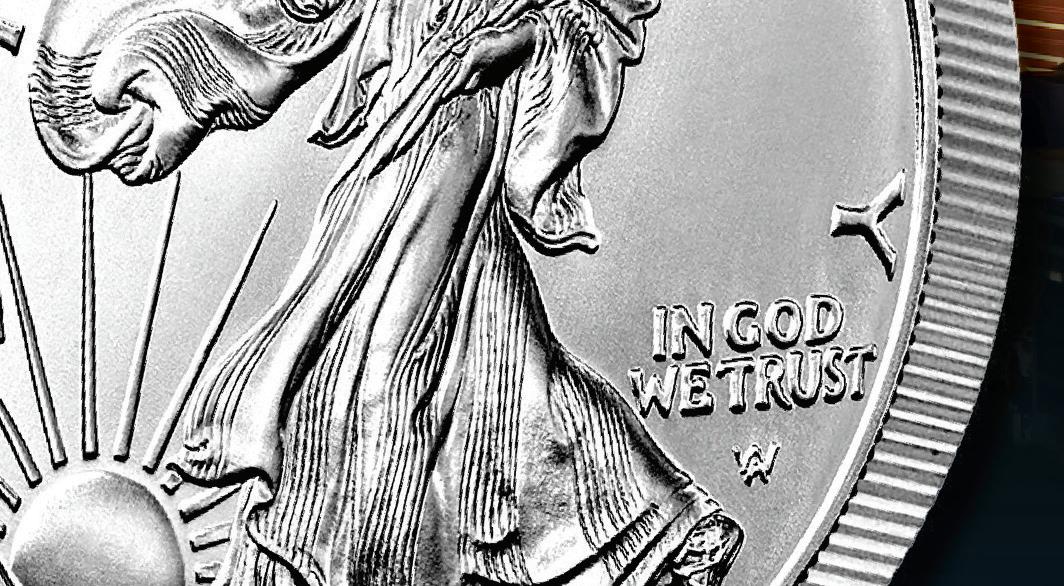































































After another memorable Global Gaming Awards Americas ceremony in Las Vegas, Gaming America reviews the three products that won specific product-related categories, featuring Aristocrat, IGT PlayDigital and Inspired Entertainment.
Having won the Slot of the Year award at the 2025 Global Gaming Awards in Las Vegas, Aristocrat’s Phoenix Link has quickly become one of the supplier’s best-selling games. Launched in 2024, Aristocrat Gaming’s






Phoenix Link puts fresh twists on features like the classic Hold & Spin with scaling Grand and Major Jackpots, as well as Free Games that reward you with Wild Multipliers or Twin Spins. Players also have a chance to trigger a Free Hold & Spin Feature from the mystery hit-by Phoenix Counter,





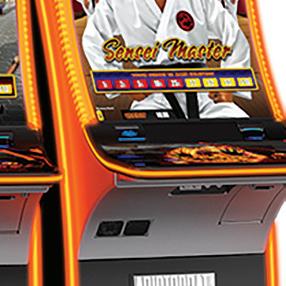

which is incremented by any Phoenix symbols appearing on screen. Housed in the majestic Neptune Single cabinet, Phoenix Link has four new titles featuring stunning graphics, lights and sounds.
Phoenix Link has gained notoriety as an instant global sensation, quickly becoming one of the fastest and best-selling games in Aristocrat Gaming’s history. Boasting player-favorite mechanics from top games with all-new themes, features and bonuses, it skyrocketed to the top of industry reports. Cementing its place as one of the top slot games on casino floors today, Aristocrat Gaming took home the Slot of the Year award at the 2025 Global Gaming Awards in Las Vegas for the success generated by Phoenix Link over the past 12 months.





Its four games debuted at numbers one, two, three and four on the list of premium leased new games, as the title continues to perform for operators at record-setting levels with a 3.65x house average, maintaining its rank as top indexing new parent family.
















































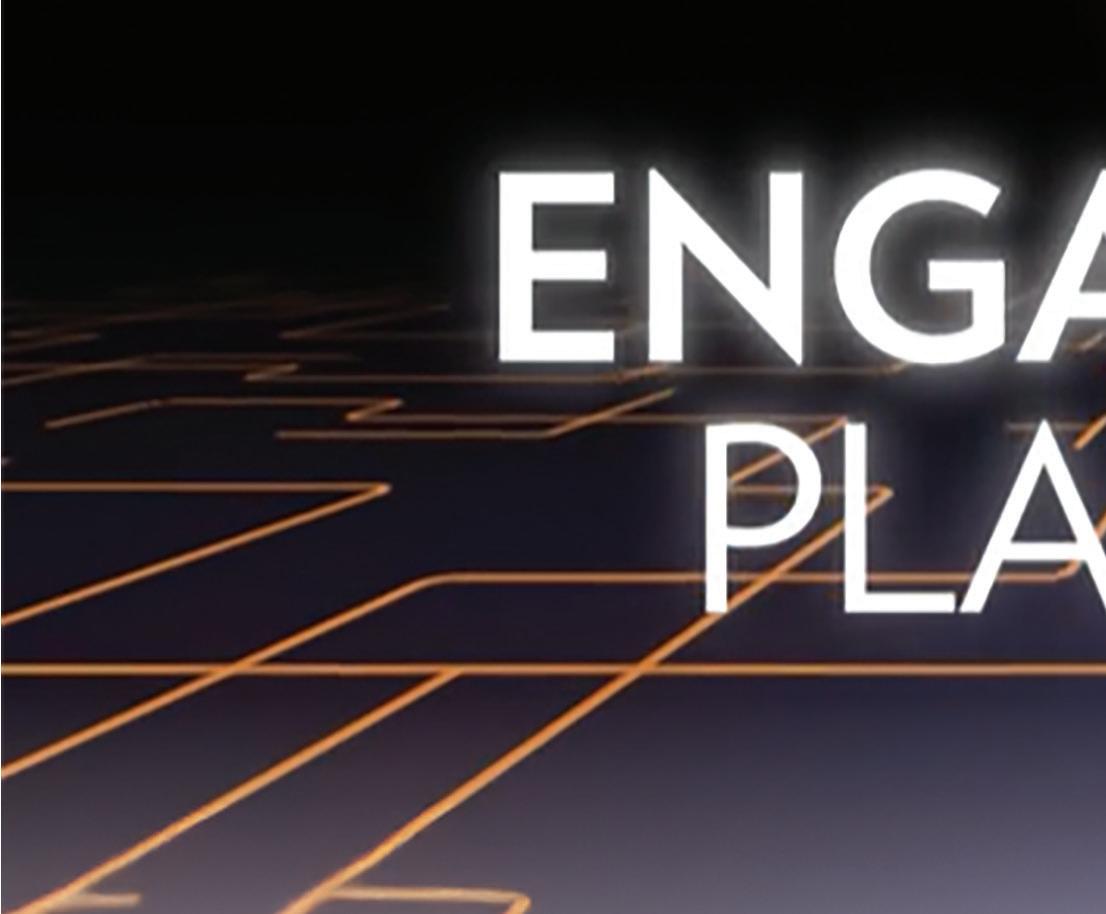




As the 2025 Global Gaming Awards Digital Product of the Year, IGT PlayDigital's fully customizable Engagement Platform strives for an innovative take on the gaming experience.
IGT PlayDigital’s revolutionary Engagement Platform gives operators everything required to engage, retain and reward players – all through a single integration. The suite of tools and services are game-agnostic – they can be deployed across proprietary games and any aggregated content on IGT’s platform, regardless of provider or RTP. The Engagement Platform was recently



























recognized as the Digital Product of the Year at the 2025 Global Gaming Awards in Las Vegas.
recognized as the Digital Product of the Year IGT PlayDigital’s Engagement Platform

The Engagement Platform’s Prize Engine allows partners to create custom multi-level Cash Drop or Marketing Jackpot promotions and tailor campaigns to any game, provider and RTP across all IGT and aggregated games on the supplier’s platform. Additionally, the Player Hub offers fully customizable personalized content, a hugely popular feature with operators, to create game recommendations, provide quick access to a player’s favorite titles, showcase the current top games and display gameplay video inside the widget midspan.
IGT PlayDigital’s Engagement Platform provides a unique combination of cuttingedge gamification tools and personalized features, ensuring operators can deliver captivating experiences that stand out in today’s competitive iGaming landscape. The suite of customizable tools offers six key elements which has allowed operators to transform its approach to player retention and engagement, all available via a single API.
With a focus on marrying up best-inclass content with next-level marketing tools, the Engagement Platform has been a proven driver of value for operators, as IGT PlayDigital strives to create an environment for success for its partners.





Inspired Entertainment’s Hybrid Dealer won the Product Innovation of the Year award at the 2025 Global Gaming Awards, helping to set the pace for the next era of casino gaming.
Hybrid Dealer is a next-generation iGaming format from Inspired Entertainment that is revolutionizing online gaming by merging high-definition pre-recorded dealer footage with RNGbased outcomes.
With scheduled host appearances and 24/7 availability, Hybrid Dealer keeps gameplay fresh and engaging while eliminating the high costs and operational challenges of traditional live setups, making it a smart, scalable solution for operators. Already live with top-tier casinos in North America, the UK and Europe, Hybrid Dealer delivers superior scalability, flexibility and efficiency.
Hybrid Dealer won the Product Innovation of the Year honor at the 2025 Global Gaming Awards in Las Vegas after achieving 800% growth and a 124% revenue uplift, outperforming top-tier slot launches over the past 12 months. Adopted by BetMGM and Caesars, it drove a 40% rise in acquisition and 20% higher retention from players. Scalable, immersive and cost-effective, with expansion to Loto-Québec in 2025, it sets a new benchmark in product innovation, setting the pace for the next era of casino gaming.





The Inspired Entertainment product delivers an engaging, cost-effective and compliant solution which is redefining what’s possible in iGaming. Powered by Inspired’s unmatched technology, innovation and customization capabilities, any brand could lead the charge into the next generation of casino entertainment.






























Bonus content in our bumper Product Reviews section, as Gaming America reviews four more products that are new on the market, featuring Ainsworth, Incredible Technologies, Gaming Arts and Interblock.
Dragon Legacy ignites the reels with five legendary pots in one thrilling adventure. This fresh take on the industry’s favorite growing pots game mechanic delivers nonstop action where a single lucky hit can trigger exciting bonuses.
Unleash Premium Symbols to transform matching icons into high-paying treasures, spin the wheel, take your chances in the Jackpot Pick or soar into Free Games – each capable of leading to any of the five epic features. The first-of-its-kind Red Envelope Reveal turns every spin into a mystery hunt: land the target symbol, scratch to uncover a multiplier and watch more envelopes unlock bigger rewards.
Designed to capture both new and seasoned players, Dragon Legacy delivers an exhilarating blend of anticipation, variety and visual spectacle. Its vibrant dragon-themed artwork, paired with dazzling animations and sound effects, immerses players in a world of fortune and fire.










Every feature brings unique potential,
















Every feature brings unique potential, keeping the excitement alive with each spin and offering countless paths to legendary wins.

legendary wins.

































reimagines it with elevated engagement








The game’s Five Pots mechanic has long been a player favorite, and Dragon Legacy reimagines it with elevated engagement and more ways to win. Whether players are chasing a big jackpot or hoping for a surprise reveal, the seamless transitions between features ensure momentum never slows.




















Ainsworth’s Dragon Legacy stands combining time-tested mechanics with

































With its mix of mystery, excitement

























Ainsworth’s Dragon Legacy stands as a testament to creative design and player-focused innovation. By combining time-tested mechanics with groundbreaking twists, it sets a new standard for feature-driven gameplay. With its mix of mystery, excitement and the promise of legendary rewards, Dragon Legacy is more than just a slot – it’s an adventure waiting to unfold, where every spin carries the potential to awaken the dragon’s power and unlock untold riches.



“THIS FRESH TAKE ON THE INDUSTRY’S FAVORITE GROWING POTS GAME MECHANIC DELIVERS NONSTOP ACTION.”

















awaken the dragon’s power and unlock

















































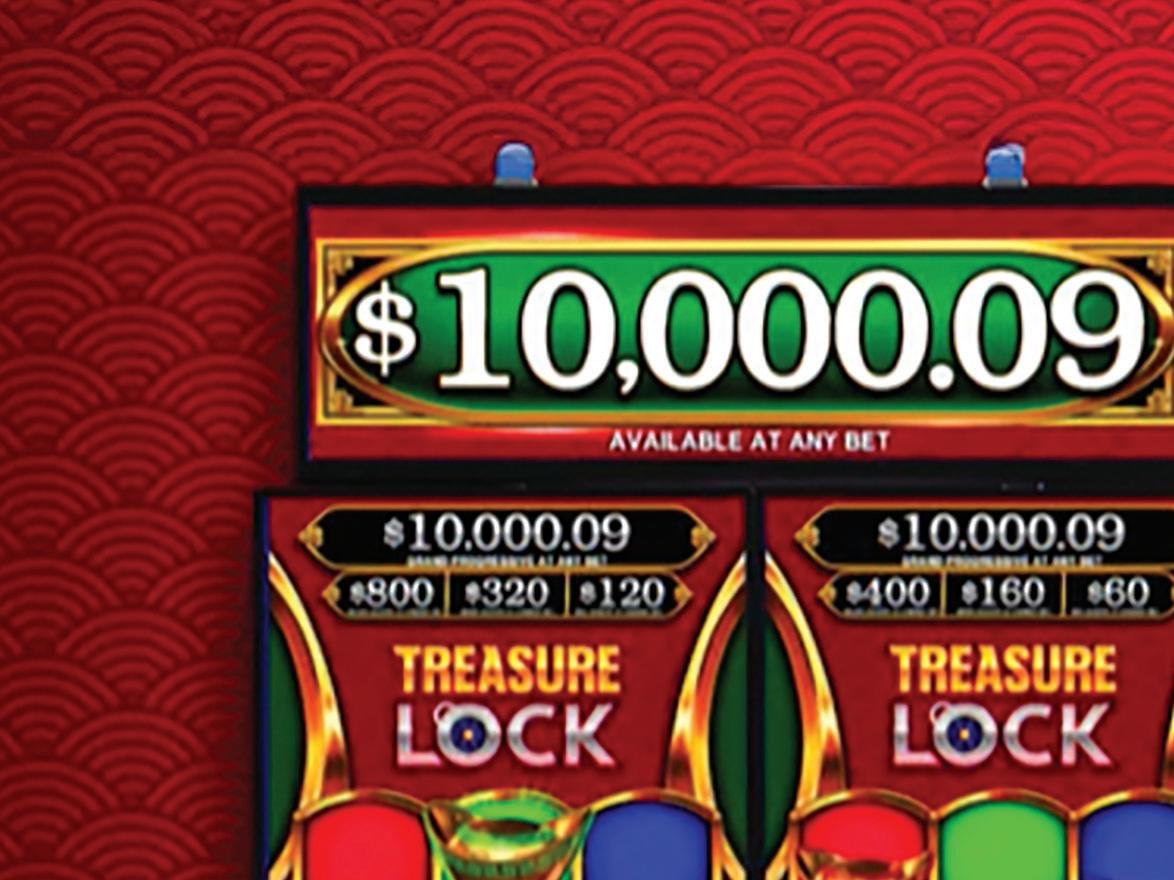




The Incredible Technologies title includes a lock and spin bonus with added multipliers, saver spins and a wheel feature, along with 25 lines of fixed-bet reels.
Treasure Lock Emperor’s Gift is Incredible Technologies’ newest innovation available on Infinity V55 and Summit cabinets with trending features, easy to follow gameplay and 25 lines of Eastern-inspired graphics on a beautiful 4K screen.
Three dazzling golden ingots rest above the reels, each holding a special pay enhancement feature for the Lock and Spin bonus! Any single Lock and Spin scatter may trigger its corresponding ingot, or simply
fly up to the ingot to increase the size and towering pile of gold it rests on. Golden ingot scatters may be triggered on their own or in combination of two or three for even better bonuses!
A red scatter initiates a Lock and Spin bonus with an added multiplier feature –up to 5X – where frames of multipliers are added to the grid! Players have three spins to land prize orbs within the grid. If three consecutive spins occur without locking a scatter, the bonus concludes. However, the green ingot, when triggered, can save players! The saver feature grants additional spins to players who have run out of their chances to land prizes.
When the count reads “last spin,” the
green ingot sends a flash to the reels and resets the count back to three. The blue ingot gives players the chance to spin a wheel for a Grand progressive and three jackpot awards. This feature adds wheel scatters to the reels during the Lock and Spin bonus. Multiple wheel scatters may lock, and when triggered with the multiplier ingot, players can spin the wheel up to 5 times on a single locked wheel scatter!
With a progressive at any bet and the chance to trigger three bonus features at once, players will be thrilled to sit down at Treasure Lock Emperor’s Gift and see just how generous the Emperor will be.
The Glory of Giza series features two titles, Blessing of Rana and Ramses Favor, which include multi-screen attraction, eight player-selectable denominations and hold & spin features.
Gaming Arts’ new slot series, Glory of Giza, was officially introduced at the 2025 Global Gaming Expo (G2E) in Las Vegas, where the Gaming America team was on hand to experience the series’ two games, Blessing of Rana and Ramses Favor. Blessing of Rana features stacked wild features, where


















during the base game version of the title, any wild symbols which appear may bring the Rana character to life, expanding the Wilds and offering more opportunities for high payouts to users.
The series’ hold & spin technology includes a unique tower feature which unveil boost and collect symbols for casino players. Boost symbols advance players up the prize tower where they can win cash prizes or jackpots, whereas collect symbols award and clear cash values across the board. Free spins with wilds are another way

to get into the hold & spin bonus, with a second chance feature awarded when no bonus win is achieved.
Features of both titles include stunning visuals with multi-screen attraction mode, bespoke soundtrack for enhanced player experiences on the casino floor, up to eight playerselectable denominations, the hold & spin with additional innovative features and the two unique themes branded with the Glory of Giza series. Gaming Arts expects to release the titles within the coming months to have Glory of Giza ready for casino floors in 2026.




















































































































Housed in Interblock’s sleek Universal Cabinet, Free Fall Roulette features a pinball-style ball drop mechanism that dynamically alters the ball’s path with each round.
Interblock is reshaping the casino floor with AMUSE, an innovative category that pushes the boundaries of traditional gaming. Historically, casino floors have been divided into three core segments: slots, table games and electronic table games (ETGs) – a category Interblock helped elevate into its own.
Roulette brings a modern twist on one of the most iconic table games. Developed for players of legal age, it blends the thrill of roulette with interactive, amusement-inspired features to create a game that’s just as captivating to watch as it is to play – and will lead the launch of over a dozen new concepts in the expanding AMUSE lineup.
watch, hoping it lands in the pocket they wagered on.
Now, AMUSE introduces a fourth segment focused entirely on amusement-style titles powered by RNG wagering. Designed to engage a broader player base, AMUSE enhances entertainment value, creates incremental revenue opportunities and delivers an immersive, player-centric experience that stands apart from anything else on the floor.
Housed in Interblock’s sleek Universal Cabinet, Free Fall Roulette features a thrilling pinball-style ball drop mechanism that dynamically alters the ball’s path with each round. The game is available in three distinct configurations – including a Plinko-style path – that create unique ball movements and build suspense as players
Visually, Free Fall Roulette makes a bold statement. A brilliantly illuminated roulette wheel, accented with vibrant neon details, serves as a commanding centerpiece, while vivid LED signage powered by Interblock’s Immersion Technology projects spectacular visuals that draw attention from across the property, turning every spin into an unmissable event. This blend of variety, anticipation and aesthetic appeal keeps players enthralled round after round while giving operators a high-impact attraction that elevates their gaming floor.
revenue opportunities and delivers an design and immersive experiences sets more than a new category – it’s the future

Leading the AMUSE lineup, Free Fall




















Interblock’s commitment to innovation, design and immersive experiences sets a new standard for the gaming industry. Free Fall Roulette proves that AMUSE is more than a new category – it’s the future of casino entertainment.
























